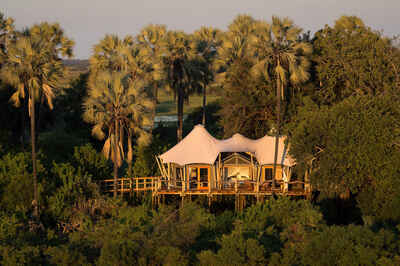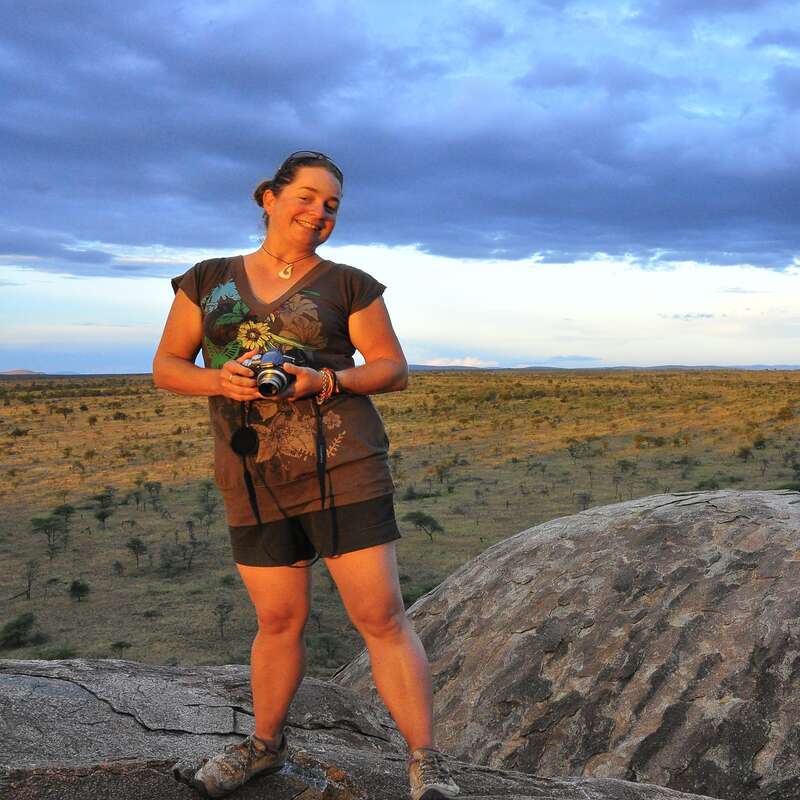About Kwetsani Camp
The small and luxurious Kwetsani Camp is set on a long narrow island in the beautiful Jao Concession (NG25) ...
... of Botswana's Okavango Delta. Elevated in the treeline, with views over a floodplain, the camp blends almost seamlessly into its surroundings. Although activities in this concession are primarily water-based, there are options for game drives and – with advance notice – walking safaris.
Kwetsani Camp stands out for its lovely location and design, and its very relaxed atmosphere. The range of activities is slightly more dependent on the floodwaters here than it is in most drier concessions, and the levels of game are not as good as elsewhere in the Delta, none the less this small camp is a lovely place to spend a couple of nights at the beginning or end of any trip.
Our view
Kwetsani Camp stands out for its lovely location and design, and its very relaxed atmosphere. The range of activities is slightly more dependent on the floodwaters here than it is in most drier concessions, and the levels of game are not as good as elsewhere in the Delta, none the less this small camp is a lovely place to spend a couple of nights at the beginning or end of any trip.
Accommodation
5 tree-house chalets
Children
Best for 12+
Open
All year
Activities

4WD Safari

Birdwatching

Boat trip

Fishing

Guided walking safari

Helicopter

Mokoro

Night drive

Private activities
Traveller reviews of Kwetsani Camp
23 real, un-edited reviews from Expert Africa's travellers.
Arrived 18 Jun 2023, 3 nights
"Kwetsani Camp review"
Overall rating: Excellent
Arrived 3 May 2016, 3 nights
"Wonderful experience"
Overall rating: Good
Arrived 26 Sep 2014, 3 nights
"Kwetsani Visit 6"
Overall rating: Excellent
Arrived 23 Jul 2014, 2 nights
"James's at Kwetsani Camp"
Overall rating: Excellent
Arrived 7 Jul 2014, 2 nights
"Kwetsani Camp review"
Overall rating: Excellent
Arrived 22 May 2014, 2 nights
"Kwetsani"
Overall rating: Good
Arrived 9 May 2014, 2 nights
"Peaceful, tranquil camp with perfect views."
Overall rating: Excellent
Arrived 11 Jun 2013, 4 nights
"Lovely camp in the delta"
Overall rating: Good
Arrived 30 May 2013, 3 nights
"Another Great Guide: MT"
Overall rating: Excellent
Arrived 22 May 2013, 2 nights
"Peaceful/Warm environment Eco Mixture lure"
Overall rating: Excellent
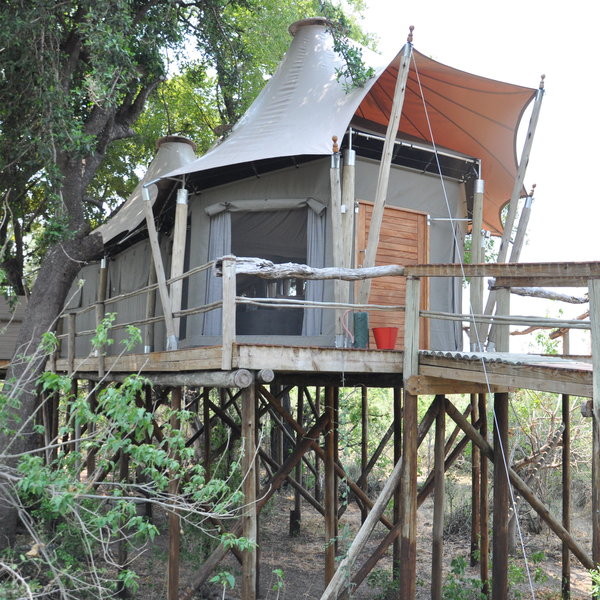
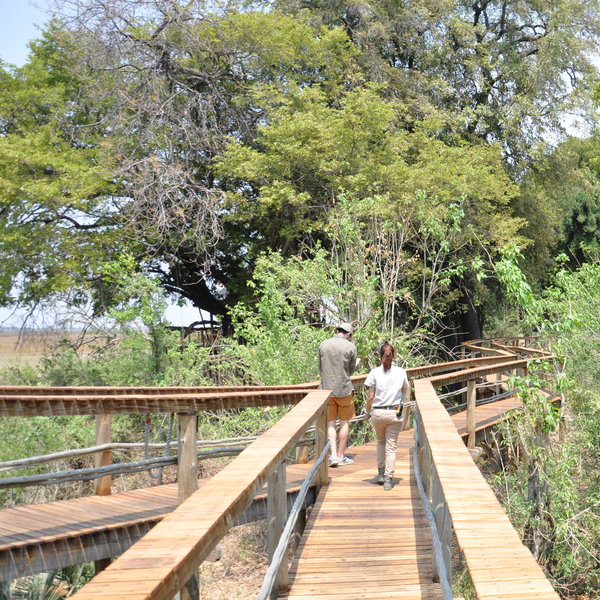
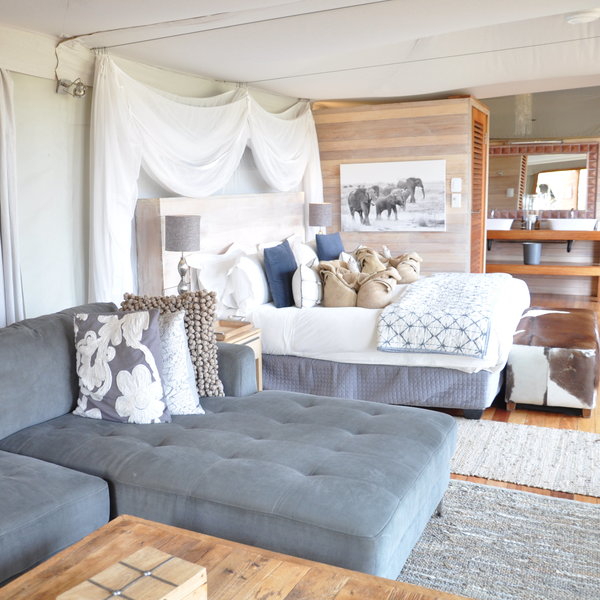
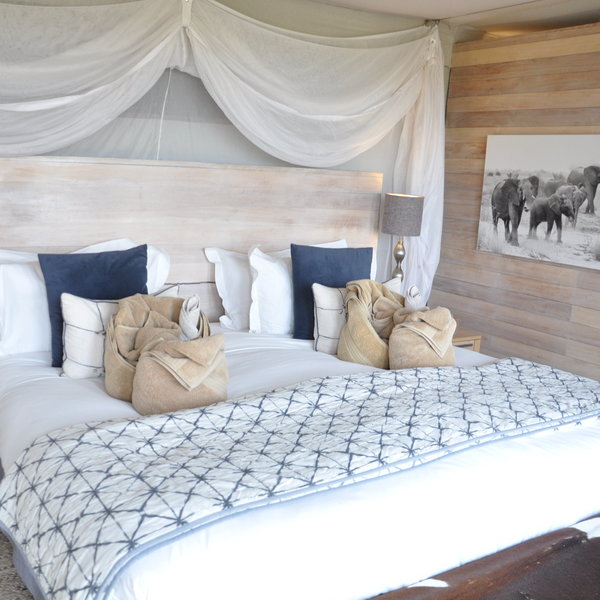
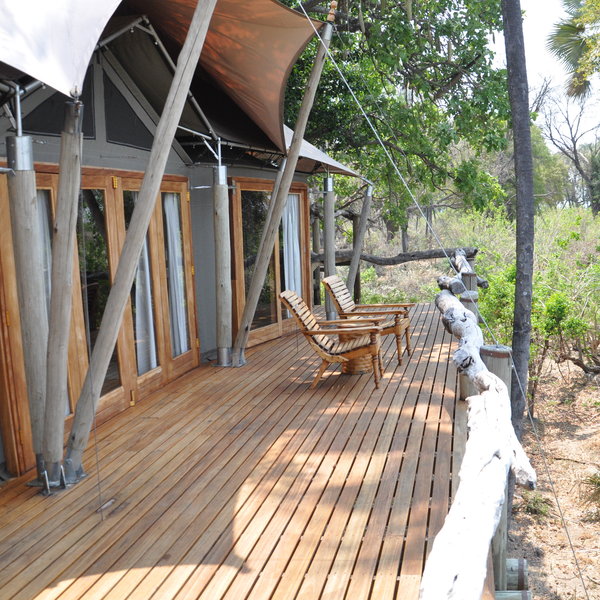
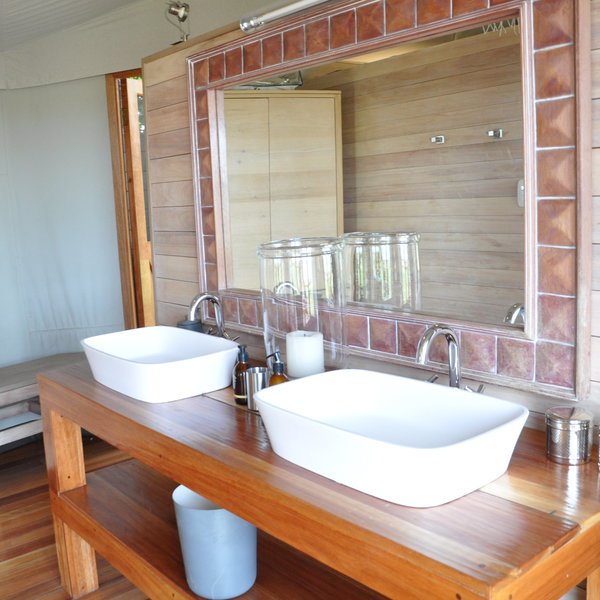
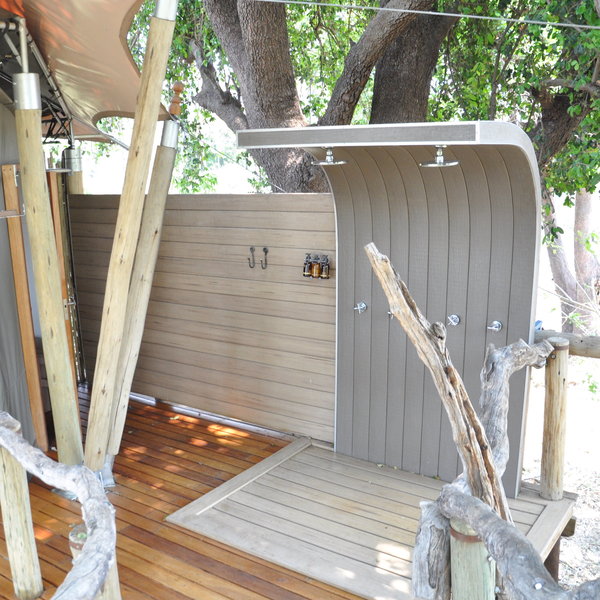
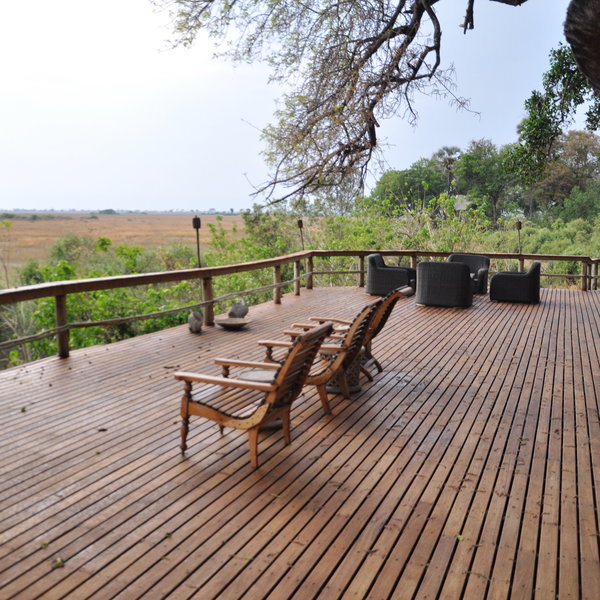
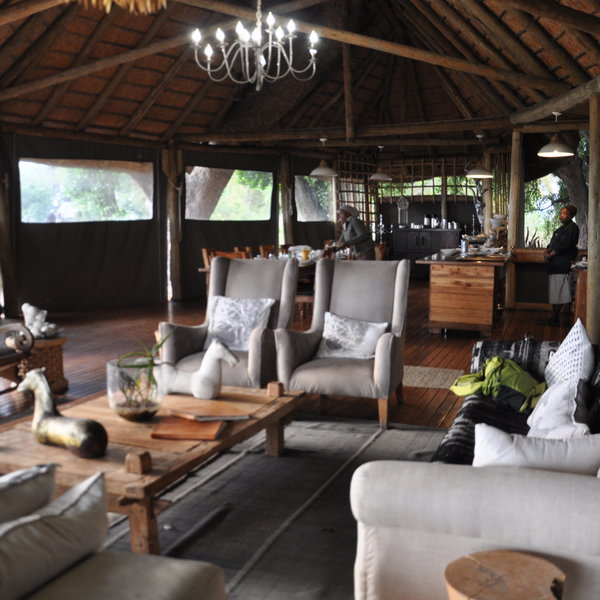
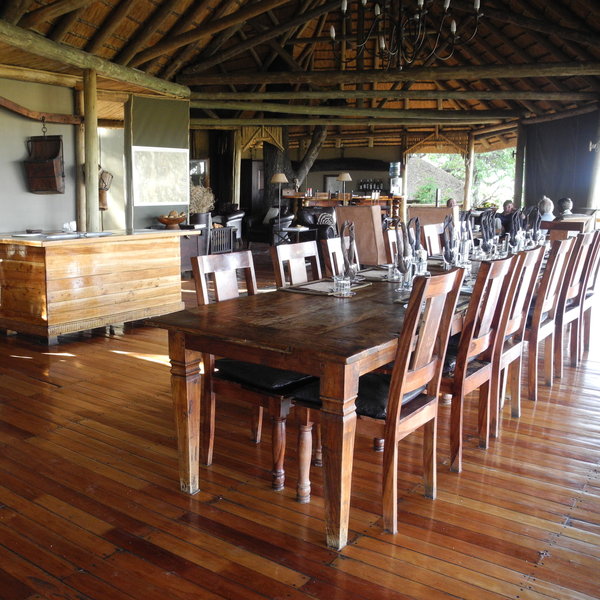
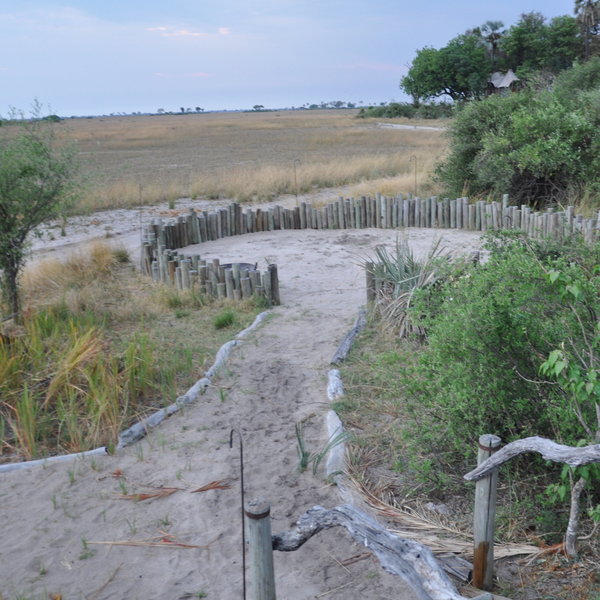
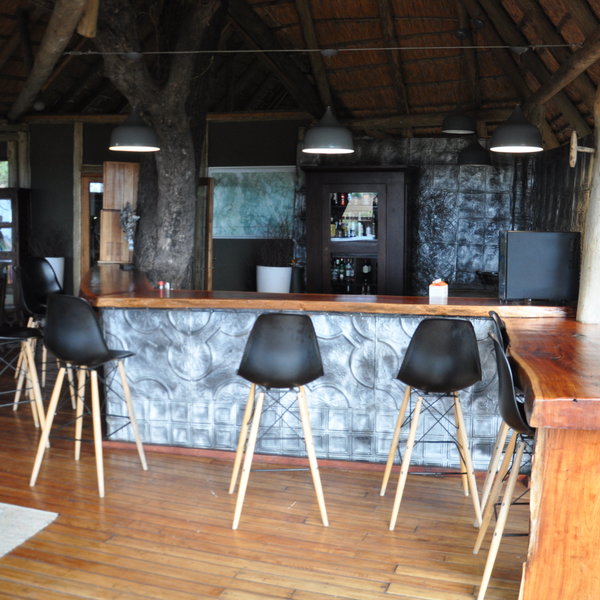
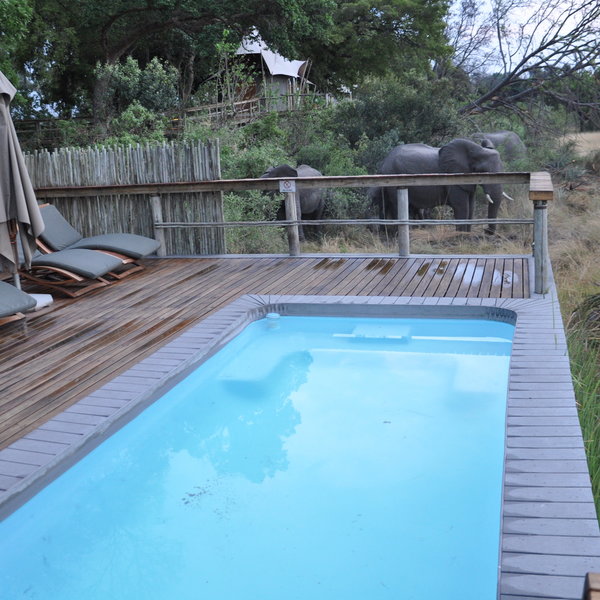
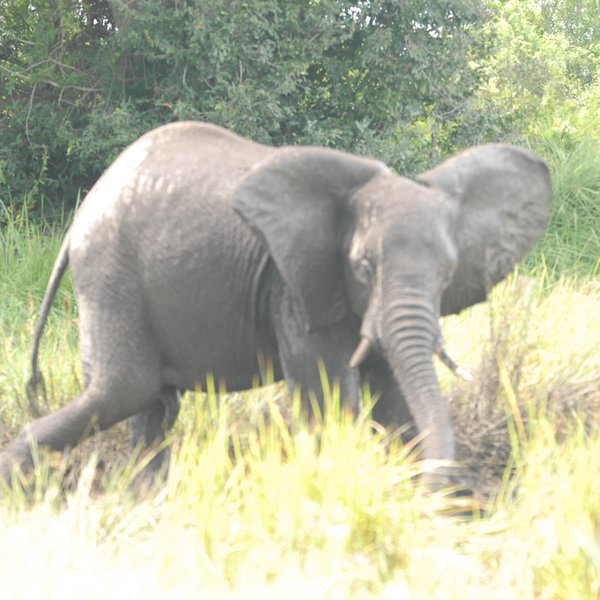
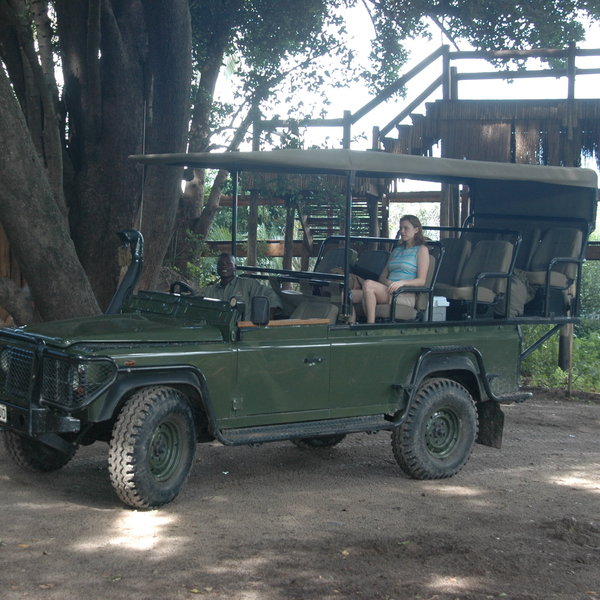
Expert Africa's gallery
When we travel we take lots of photos ourselves to give you a real and un-edited view of the safaris. See our 27 pictures of Kwetsani Camp to get the candid view.
View galleryKwetsani Camp: Our full report
The small and luxurious Kwetsani Camp is set on a long narrow island in the beautiful Jao Concession (NG25) ...
... of Botswana's Okavango Delta. Elevated in the treeline, with views over a floodplain, the camp blends almost seamlessly into its surroundings. Although activities in this concession are primarily water-based, there are options for game drives and – with advance notice – walking safaris.
Much of Kwetsani, including all the tents and parts of the main area, were rebuilt and refurbished in 2015, giving the camp a smart, fresh feel. On our visit in October 2017, we thought it looked more modern than its neighbouring camps in the Jao Concession, which include Jacana, Jao, Pelo and Tubu Tree Camp
Kwetsani Camp has five 'tree-house' chalets, nestled amongst palm, mangosteen and fig trees, and linked by raised wooden walkways. Spacious, stylish, and built high up on stilts for lovely views of the surrounding area, each is of a high-quality pole-and-canvas construction. All the chalets have a couple of chairs and a table on their verandas, most of which incorporate trees into their design.
At first glance, you could be forgiven for thinking that the chalets are open-sided to the front and sides, courtesy of large windows and glass double doors, which can be concertinaed open to give a bright and airy feel. The airflow is further cooled by the presence of two ceilings fans.
Through a heavy, wooden door leading off the walkway, you are greeted by a large L-shaped sofa, in a plush grey fabric. There’s a desk and a chair, too. along with twin or king-size beds within a large box-shaped mosquito net. Laminated floors, rattan rugs and brushed wood furniture add to the high- end feel, The bathroom is largely open plan, although there is an enclosed toilet cubicle, and the structure housing his and her sinks and a large mirror creates privacy for an indoor shower. A door leads to a second, outdoor shower set beneath the tree canopy and with views of the surrounding plain.
The thatched main area at Kwetsani is completely open on one side, affording good views from the spacious lounge and dining area over the surrounding floodplains. Inside, comfy sofas and various wood, cane and leather armchairs are arranged around heavy wooden tables, where various natural-history books and magazines are provided for guests to browse. The long wooden table is conducive to sociable gatherings at mealtimes, while the well-stocked bar, which encompasses a jackalberry tree, also has a 'help-yourself' fridge – ideal when there isn't a staff member around. There's a well-stocked curio shop, too – and don't forget to try out the quirky 'loo with a view'!
From the large open deck to the front, designed around several mature trees, the views stretch east across the Delta floodplains, so you can watch the sunrise while enjoying an early breakfast. There is a viewing scope for spying the animals, including herds of red lechwe, which often wander in front of camp.
A walkway leads from the deck down to a small swimming pool with sunloungers and umbrellas. One morning, we were treated to an eye-level view of a group of elephants that had been feeding around the pool area – and making quite a lot of noise while doing so! At the other end of the day, guests often meet up for evening drinks around the firepit in the boma, where a traditional dinner is hosted each week.
The terrain in this area of the Okavango Delta changes dramatically from season to season due to the flood levels, which in turn determine what safari activities are available at Kwetsani Camp. These usually include game drives on nearby Hunda Island (the Jao Concession's main permanently 'dry' area, and the focus for game viewing), and trips by mokoro and motorboat, but all of these can occasionally be limited by water levels. Kwetsani also offers guided walks, though it is worth requesting these in advance to confirm the availability of a suitably trained guide.
With the diversity of habitats around Kwetsani Camp comes a broad range of animals and birds. Of the birds, look out for slaty egrets, saddle-billed storks, malachite, pied and woodland kingfishers, bee-eaters, Swainson's francolin, black-winged stilt, red-shouldered widow and, of course, the magnificent African fish eagle.
The Jao flats support large herds of red lechwe, buffalo, wildebeest and zebra – and where you find these, you'll also find lion! Nearby Hunda Island attracts elephant, kudu, giraffe, and other plains game – though note though that as this is the best place for game drives on the reserve, you are likely to see vehicles from other camps. When flood levels are low (generally October to April), day and night game drives should be possible in the area close to camp.
During our recent visit, we found the game drive to Hunda Island a little limiting, as a boat trip is required to get to and from the island and you must return before dark because of the risk posed by hippos. On a previous trip, however, we spent a fantastic hour watching a young male leopard stalk a herd of red lechwe – only to be given away by the alarm call of a blacksmith plover after he had painstakingly inched towards them through the tall grass.
Despite this, don't come to Kwetsani expecting the best game viewing in the Delta. Instead, with the diversity of flora and fauna and potential for land and water-based activities, you can get a really good feel for the essence of the Delta.
Activities
4WD Safari
Birdwatching
Boat trip
Fishing
Guided walking safari
Helicopter
Mokoro
Night drive
Private activities
Families & children
- Attitude towards children
- Children aged 12 years and over are welcome at Kwetsani Camp and we felt that the managers were particularly positive about receiving children. They may accept children aged 8–12 if the whole camp is booked out exclusively.
- Property’s age restrictions
- Only children over the age of 12 are accepted as standard.
- Special activities & services
- Fishing trips and craft activities (such as candle-making) can be arranged for children, and special meals can be organised.
- Equipment
- None
- Generally recommended for children
- We don't think that Kwetsani is suitable for young children. The chalets are on high stilts, connected by raised walkways, with plenty of open drops through which a child could fall. Also, rooms cannot easily accommodate a third bed.
- Notes
- Kwetsani is a very open camp with dangerous wildlife in the area and it is open to the water in the flood season, so parents must supervise their children at all times.
Food & drink
- Usual board basis
- Full Board & Activities
- Food quality
- The food at Kwetsani is served buffet-style and is generally of a good standard, as it was during our last visit in October 2017. Children and vegetarians are catered for on request.
A light pre-activity continental breakfast consisted of a selection of cereals, toast, muffins, fruit, yoghurts and tea and coffee.
Brunch at Kwetsani is served upon returning from the morning activity. Unfortunately we missed this on our last visit, but it usually consists of a cooked breakfast, another hot dish, a selection of salads, fresh bread and fruit.
High tea is served prior to your afternoon activity. In the past we have particularly enjoyed tasty breaded chicken strips, accompanied by a sweet chilli sauce, and mini caramel tarts.
For dinner, our starter of a pumpkin puff-pastry tart was followed by the choice of either venison cobbler or lemon-roasted chicken served with rice, bean salad, roasted carrots and a Greek salad. For dessert we enjoyed a coconut panna cotta with caramelised pineapple.
Once a week, the camp holds a 'traditional' night, which we were lucky to experience on a previous visit. One of the guides spoke about their traditions and culture, and the staff choir sang beautifully. This was then followed by a traditional dinner of shredded beef, mealie pap (basically ground corn, similar to mashed potato, but thicker in consistency), tomato and onion sauce, butternut, cabbage and corn on the cob. For pudding we had a 'Botswana doughnut' with honey. - Dining style
- Group Meals
- Dining locations
- Indoor and Outdoor Dining
- Further dining info, including room service
- Room service is not available
- Drinks included
- Bottled water, soft drinks, local beers and spirits and a limited selection of (usually) South African red and white wines are included. Champagne and imported wines and spirits will cost extra and may need to be requested in advance.
Filtered drinking water is provided in the rooms and there is a central water vessel to refill bottles.
Getting there
- Location
- Okavango Delta Safari Reserves, Botswana
- Ideal length of stay
- Two to three nights, depending on the time of year.
- Directions
- Guests fly in to Jao airstrip, then are usually transferred to camp by boat, although this could be by vehicle if the floodwaters have receded sufficiently.
- Accessible by
- Fly-and-Transfer
Sustainability
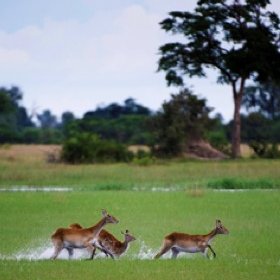
Mitigating human – wildlife conflicts
Over 150 people in Tubu village still depend on the natural resources near the Thaoge river. However, the progressive drying of the river has forced villagers to intensify the use of the Karongana system which is located partly in the Wildlife Management Area (WMA). This has created conflicts between locals and concessionaires. As a solution, the University of Botswana implemented a project called ‘Biokavango’, and in 2007, representatives from the Local Community, Government Departments, Private Sector and Non-Governmental Organizations agreed to setup a Joint Management Committee (JMC), to reduce conflict between the community and the Jao Concession – specifically with regard to curbing poaching and over-fishing.
Kwetsani Camp has been involved in the program from the very beginning and its main responsibility is to maintain order and compliance with the regulations of the JMC management plan. The camp works in collaboration with the Community Rangers in the nearby areas who are trained to monitor resources, activities and unforeseen events or threats to the local wildlife or community.
See more great sustainability projects in Botswana
Communications
- Power supply notes
- The camp uses a generator and inverter system. It's generally an efficient system but note that hairdryers draw too much power and cannot be used.
- Communications
- There is no mobile reception, no direct phone or fax and no email at Kwetsani. Contact in case of an emergency is via radio to Maun.
- TV & radio
- No television or radio
- Water supply
- Borehole
- Water supply notes
- The showers are fully plumbed and the toilets are flushable.
Health & safety
- Malarial protection recommended
- Yes
- Medical care
- All camp managers are first-aid and trauma trained and various medications are kept at camp. Wilderness have an affiliated nurse who is based in Maun and can always be contacted for further medical advice. In an emergency, clients can be flown out, if necessary, but please note that it is only possible to fly out of camp during daylight hours as the bush airstrips do not have any lighting at night.
- Dangerous animals
- High Risk
- Security measures
- Because of the Okavango's large population of dangerous game, and the fact that Kwetsani is unfenced, guests are escorted to and from their rooms after dark. 'Horns' are provided in the rooms to be sounded in case of an emergency.
- Fire safety
- There are fire extinguishers on the verandas of all chalets.
Useful info
- Disabled access
- On Request
- Laundry facilities
- Laundry is included at Kwetsani and is collected in the morning and usually returned the same day, weather permitting. For cultural reasons, the staff do not wash underwear, but washing powder is provided in the rooms for this purpose.
- Money
- No exchange facilities are offered. There are safe deposit boxes in the rooms.
- Accepted payment on location
- Mastercard and Visa credit cards are accepted; Diners and Amex are not. Credit-card transactions are limited to a minimum of P200 (Botswanan pula), but no commission is charged. Cash payments may be made in South African rand, pounds sterling, US dollars, euros and Botswana pula.
Plan and book your trip with Expert Africa
All of our trips are tailor-made, so we'll always adapt them to suit you. Talk to an Expert and let us plan and arrange your perfect trip.

Talk to an Expert
Call or email us now! We’ll match you with the Specialist in our team who is best suited to help you. Then together we can start planning your trip.

Set up your itinerary
Based on our experience and your ideas, your specialist will create a detailed, costed itinerary. We’ll refine it together, until we have a trip that you’re perfectly happy with.

Prepare for your trip
The same Specialist will make the seamless arrangements for your trip, send you detailed travel documents, and be available to answer any questions before you depart.

Travel with peace of mind
After you set off, you’ll be cared for by our partners in Africa, most of whom have worked with Expert Africa for decades. And if you ever need us urgently, we’re available 24/7.

When you return
We love to learn about your trip, and so will always be grateful if you’ve the time to give feedback to your Specialist when you return.
Kwetsani Camp's location
Look closer at the environment and surroundings of Kwetsani Camp.
Excursions from Kwetsani Camp
Optional extra day-trips and excursions possible whilst you're staying at Kwetsani Camp. Talk to us: these are usually best arranged before you go.
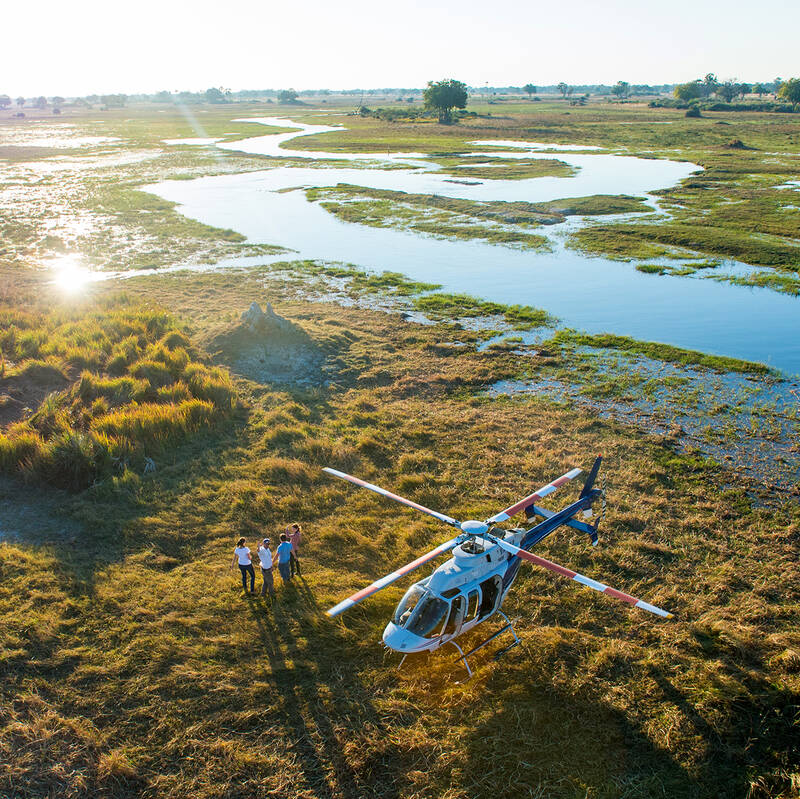
Helicopter Flight - Botswana
Various: from 30 minutes to half a day.
Low-flying, agile and offering superb views, helicopters are an ideal way to move around the Okavango Delta.You can use them instead of fixed-wing inter-lodge transfers or as an addition to other wildlife watching activities, and of course, helicopters can hover to allow that perfect pic, whereas fixed-wings can’t.
More about Helicopter FlightOther lodges in Okavango Delta Safari Reserves
Alternative places to stay in this same area.
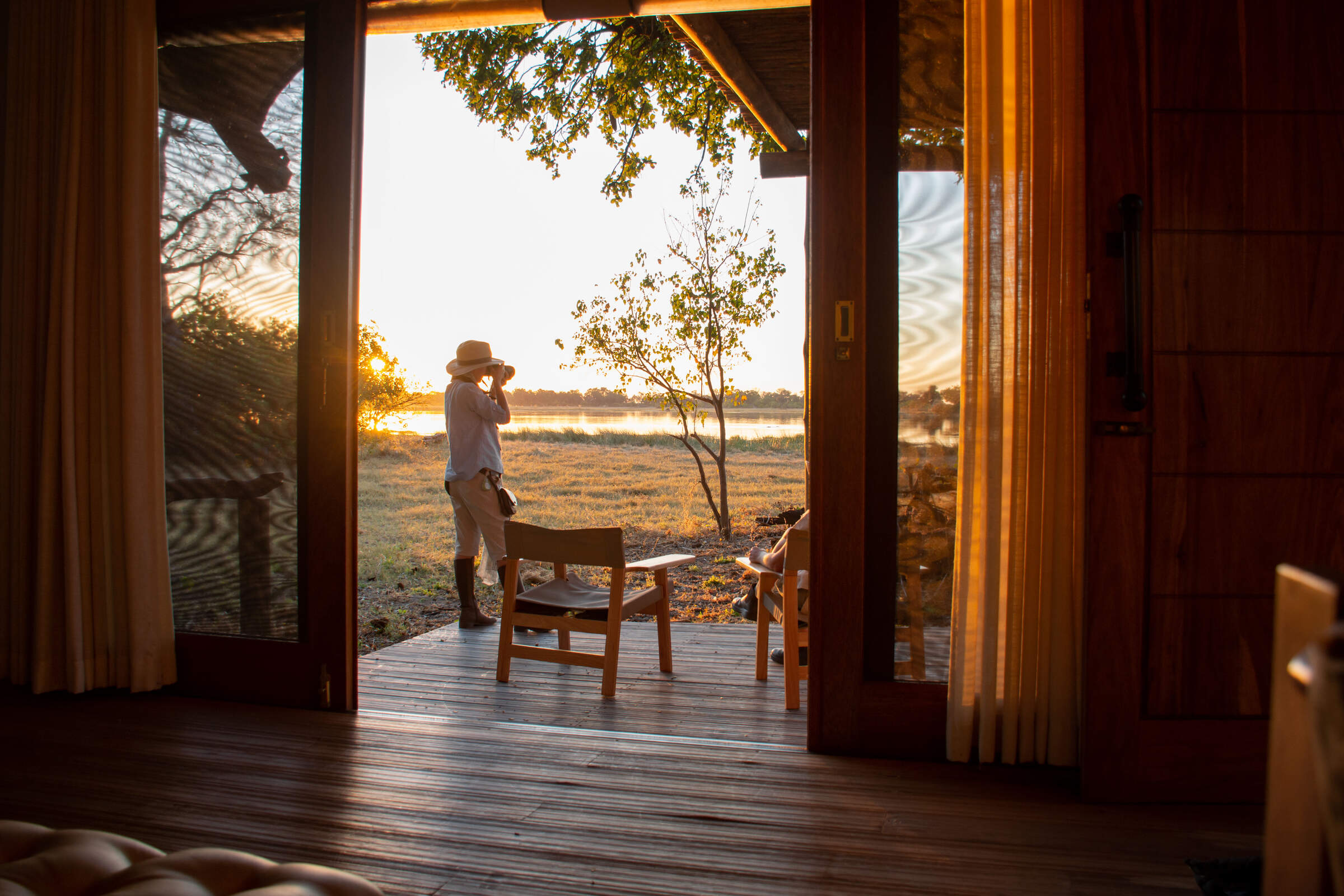
Kwara Camp
Kwara Camp's private reserve boasts land and water activities year-round, with excellent game-viewing opportunities and access to permanent channels of the north-east Okavango Delta.
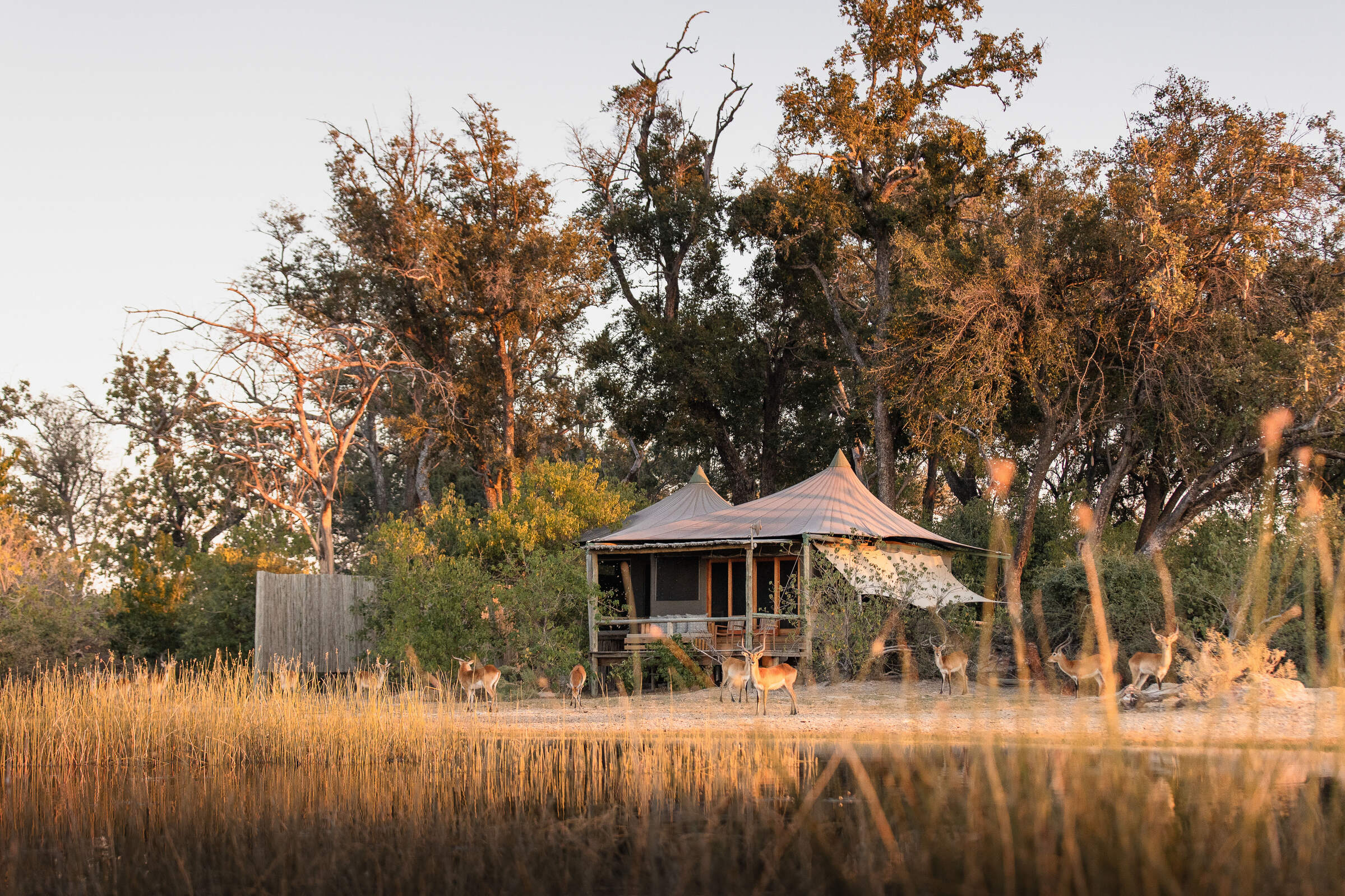
Little Vumbura
On a secluded island within a private reserve, Little Vumbura combines superb game viewing with a broad diversity of habitats in a truly picturesque setting.
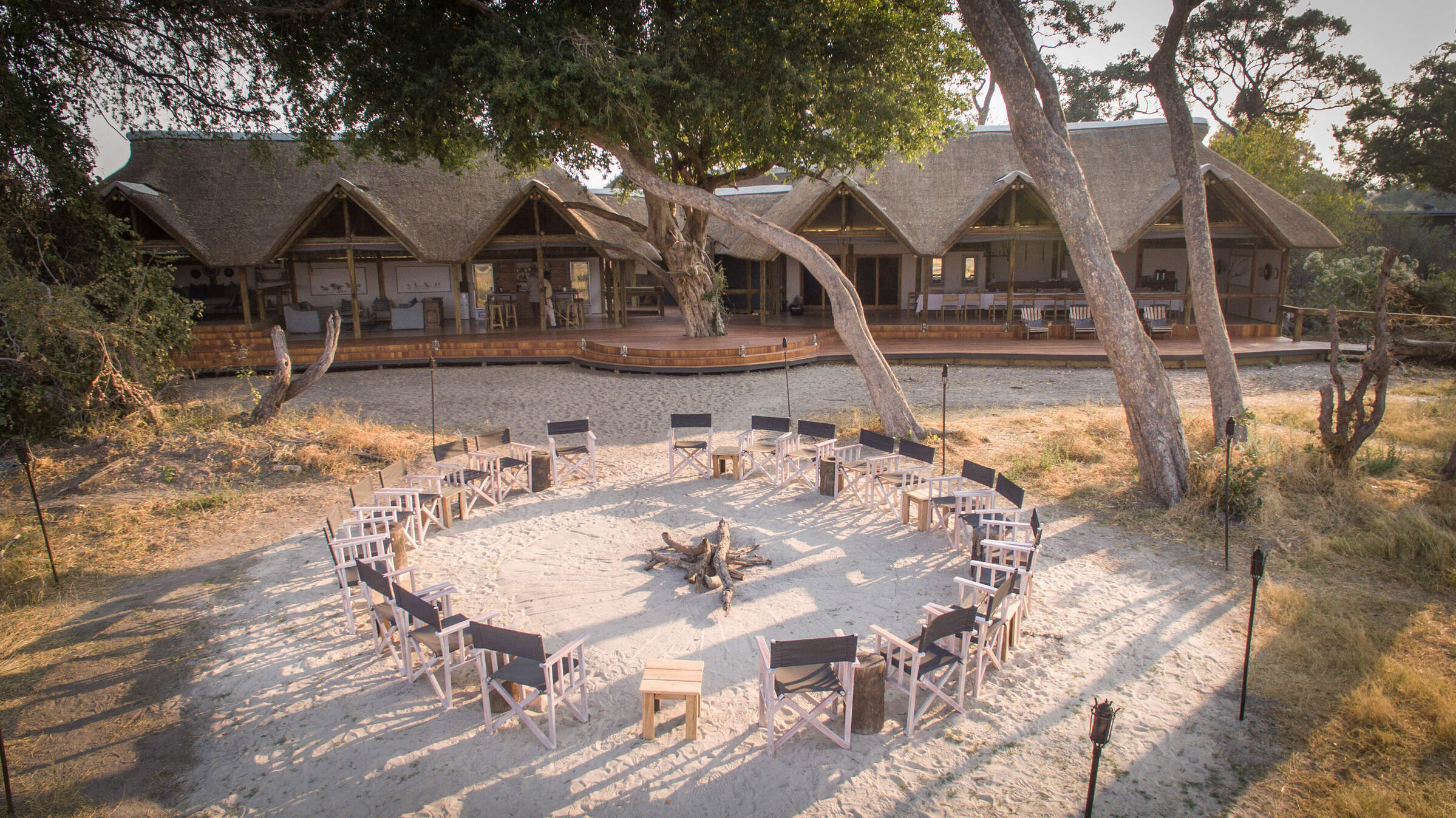
Splash Camp
Set in the Kwara Reserve, offering superb wildlife viewing year-round, Splash offers both land and water activities led by guides with a particular knack for tracking big game.
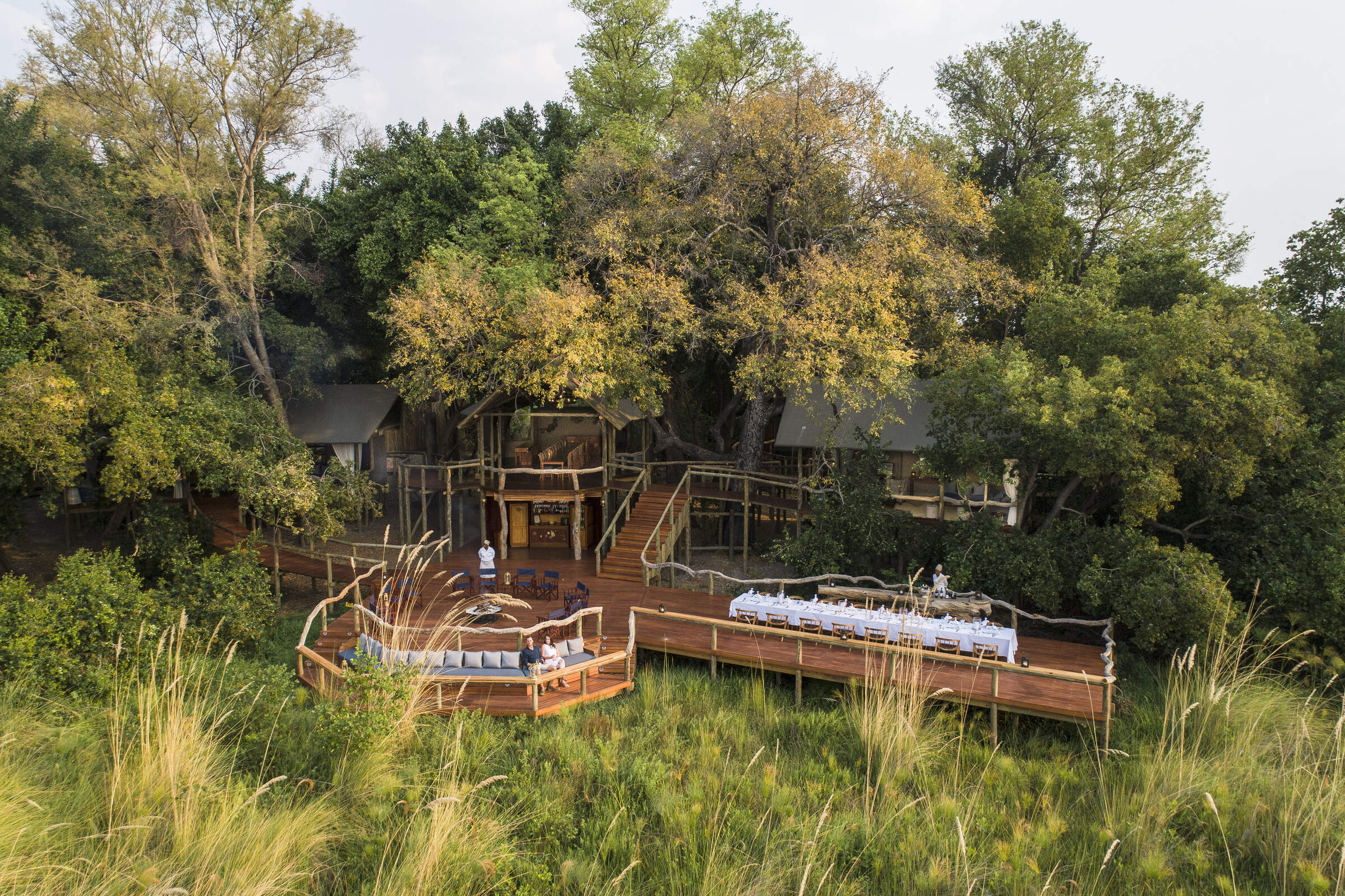
Shinde Camp
With experienced staff and a wealth of activities, Shinde offers a traditional safari in an exceptionally varied and wildlife-rich environment.
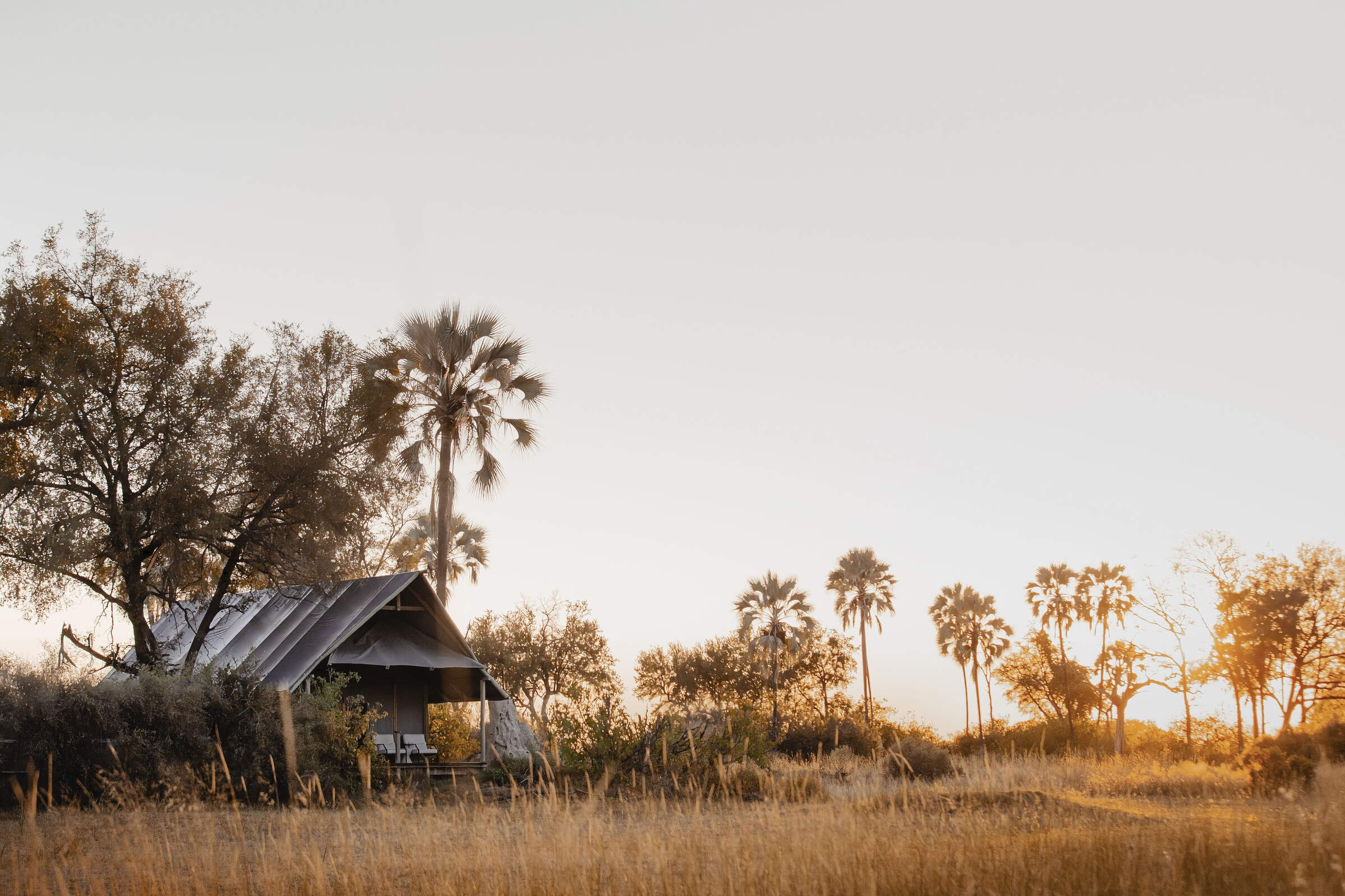
Chitabe Lediba
Chitabe Lediba, in Botswana's southern Okavango Delta, is a small family friendly safari camp; it offers great dry-land safaris and in our experience consistently delivers good game sightings.
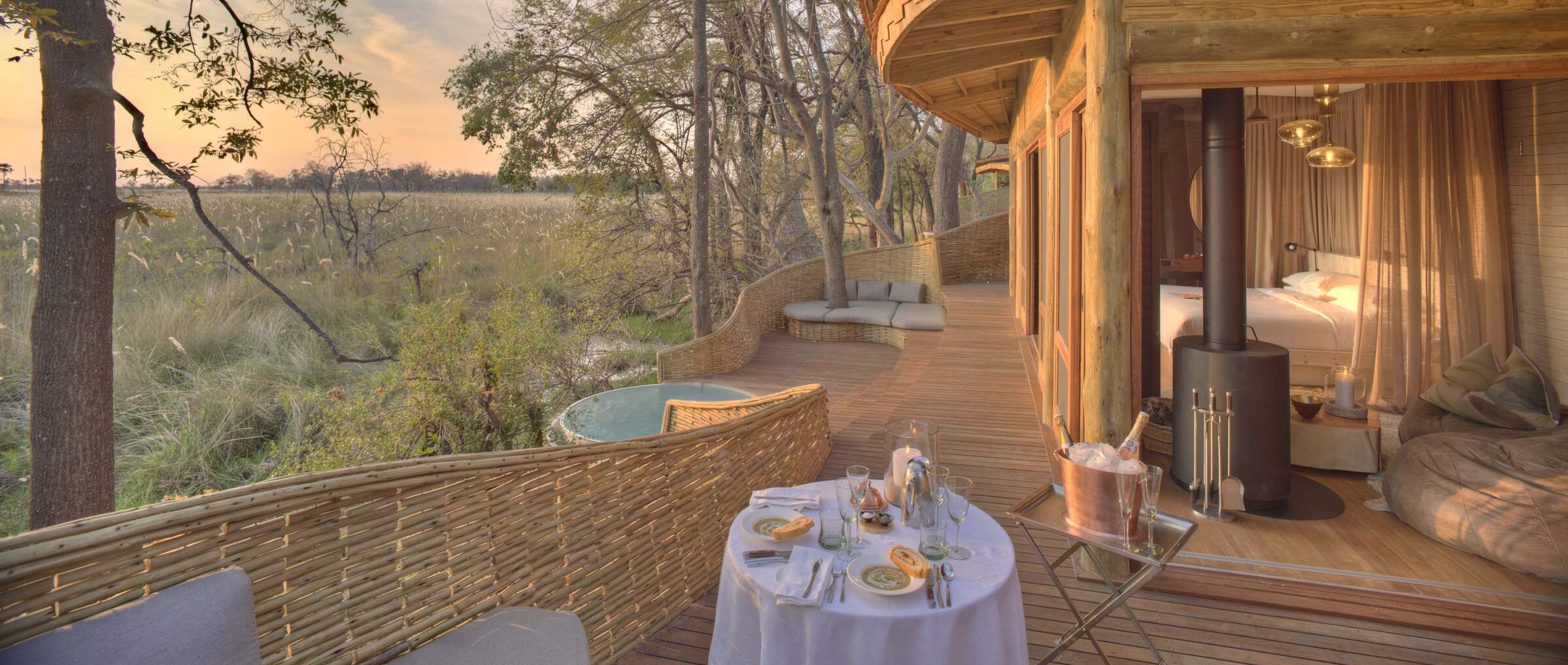
Sandibe Safari Lodge
The luxurious Sandibe Okavango Safari Lodge lies in a private concession in the heart of the Okavango Delta, beside Moremi Game Reserve, with superb big-game viewing.
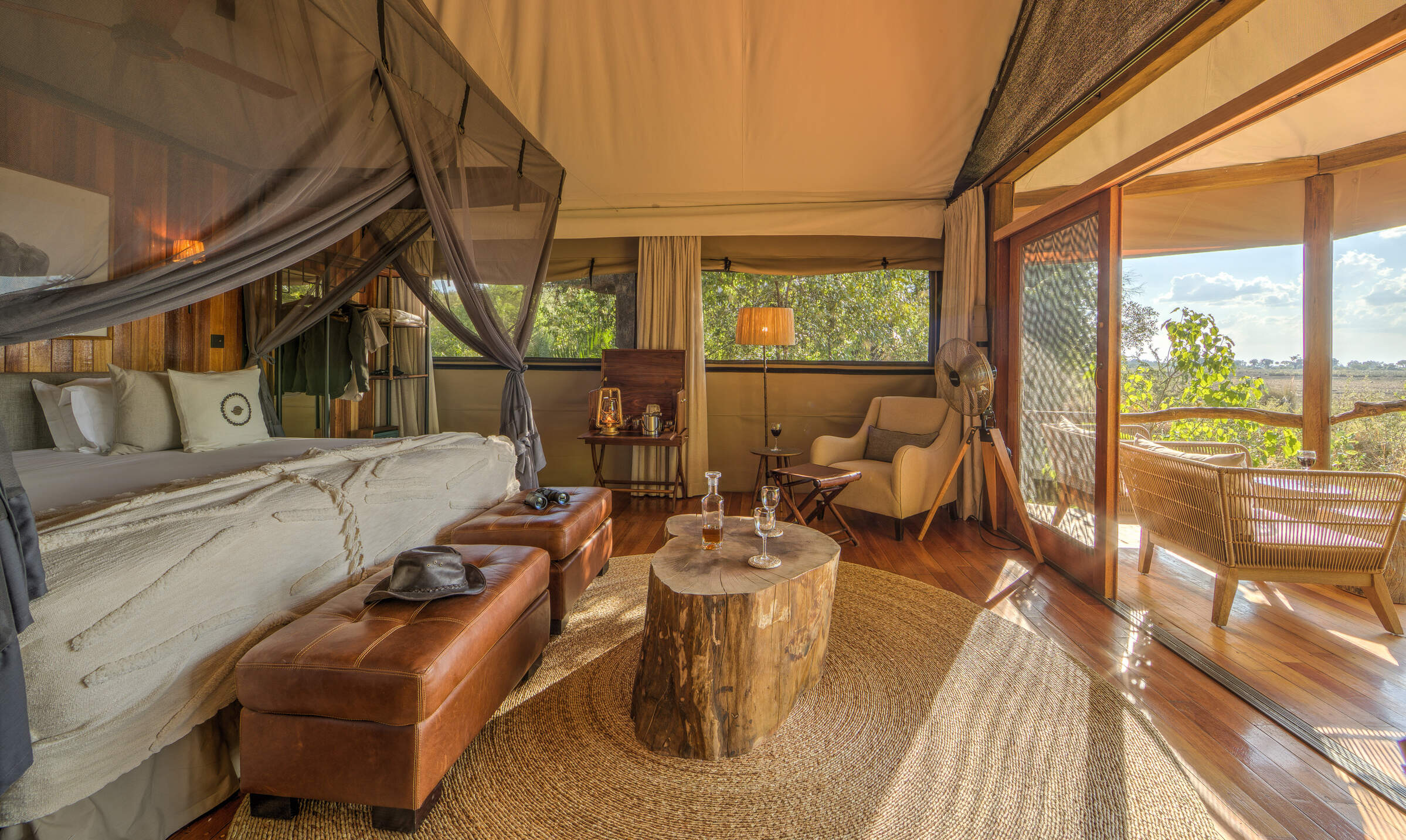
Kanana
In a beautiful part of the Delta, Kanana focuses on fantastic water activities and birding – including exclusive access to an impressive heronry.
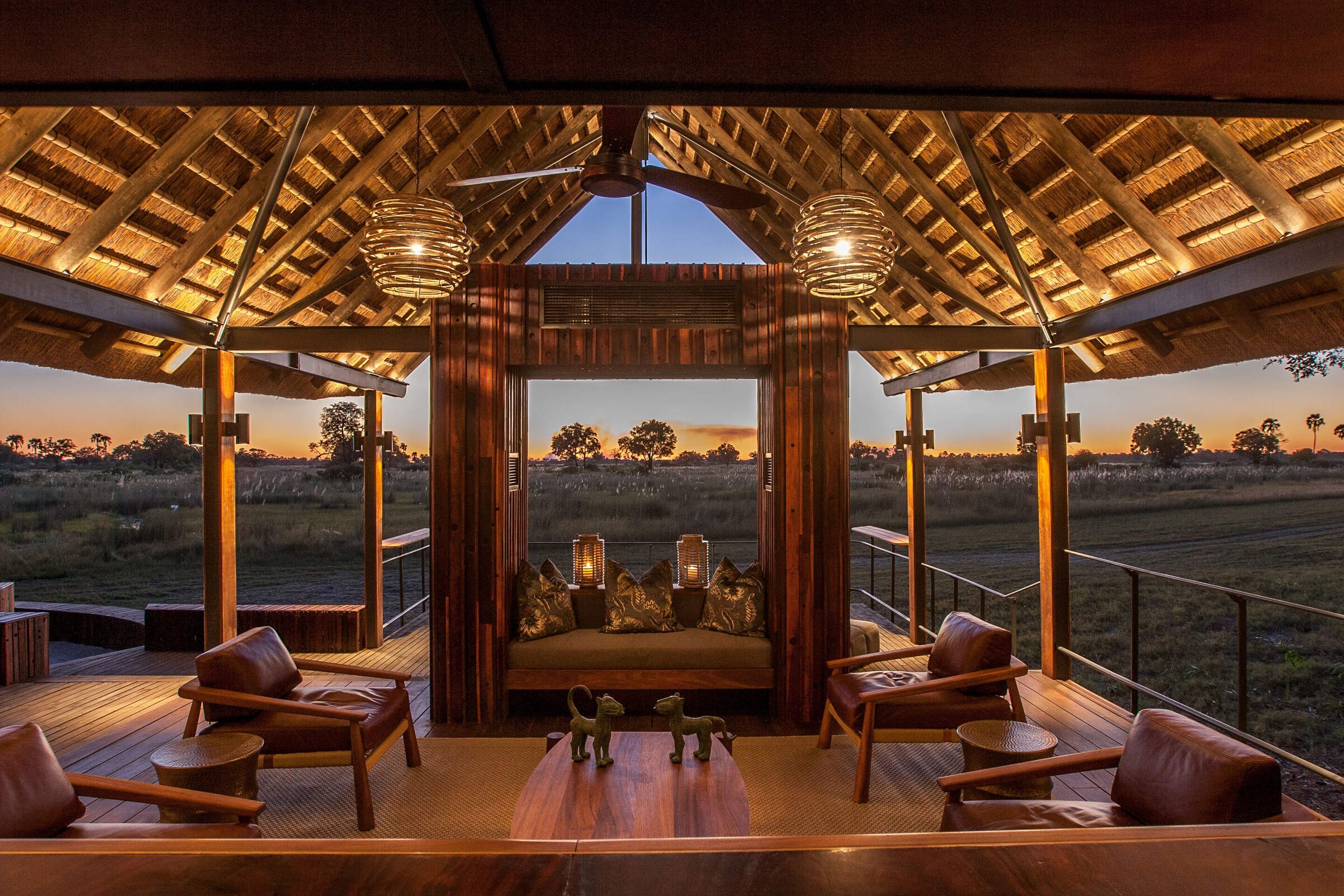
Chitabe Camp
In the southern Okavango Delta, the excellent Chitabe Camp concentrates on dry-land safaris in an area that we've found particularly good for wild dog sightings.
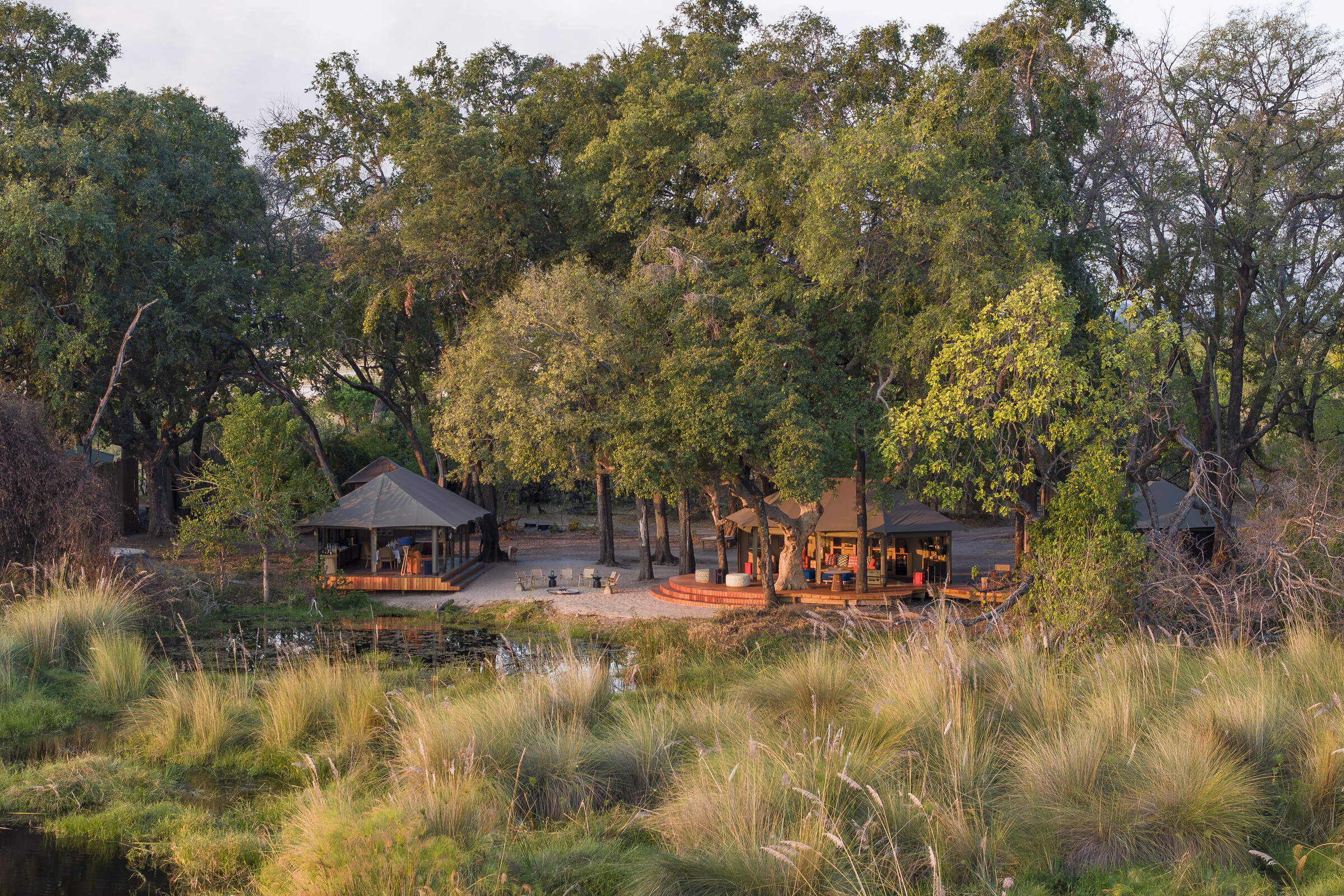
Shinde Footsteps
Small and simple, but comfortable, Shinde Footsteps focuses on walking safaris as well as game drives; it also runs a special children's programme so is particularly suitable for families.
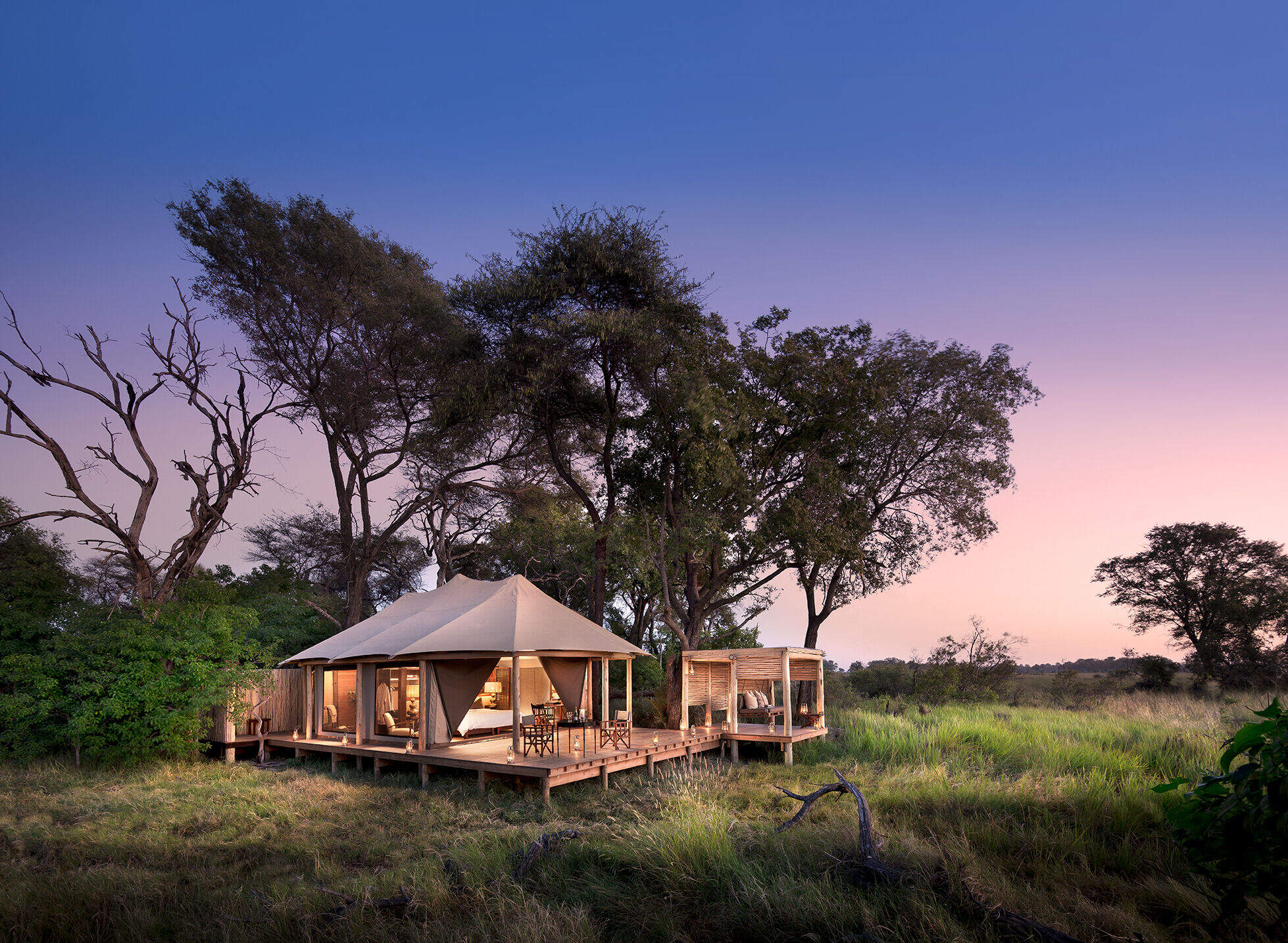
Nxabega Tented Camp
Nxabega offers a selection of both land- and water-based activities, plus very good guiding, food and service, but game viewing can be somewhat erratic.
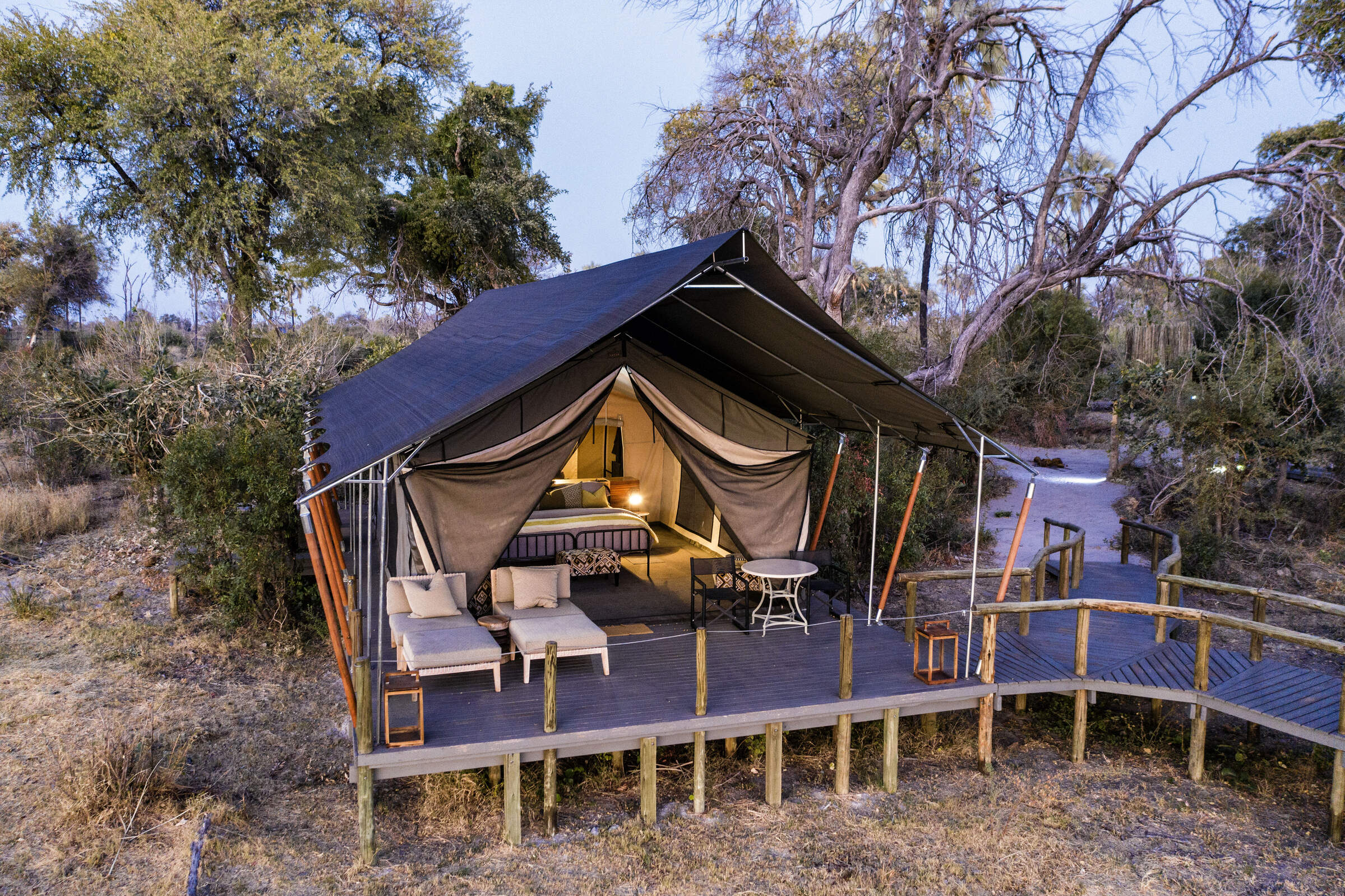
Gomoti Plains
Overlooking a tributary of the Gomoti River, Gomoti Plains Camp is a classically designed camp with very comfortable tents in a good game-viewing area.
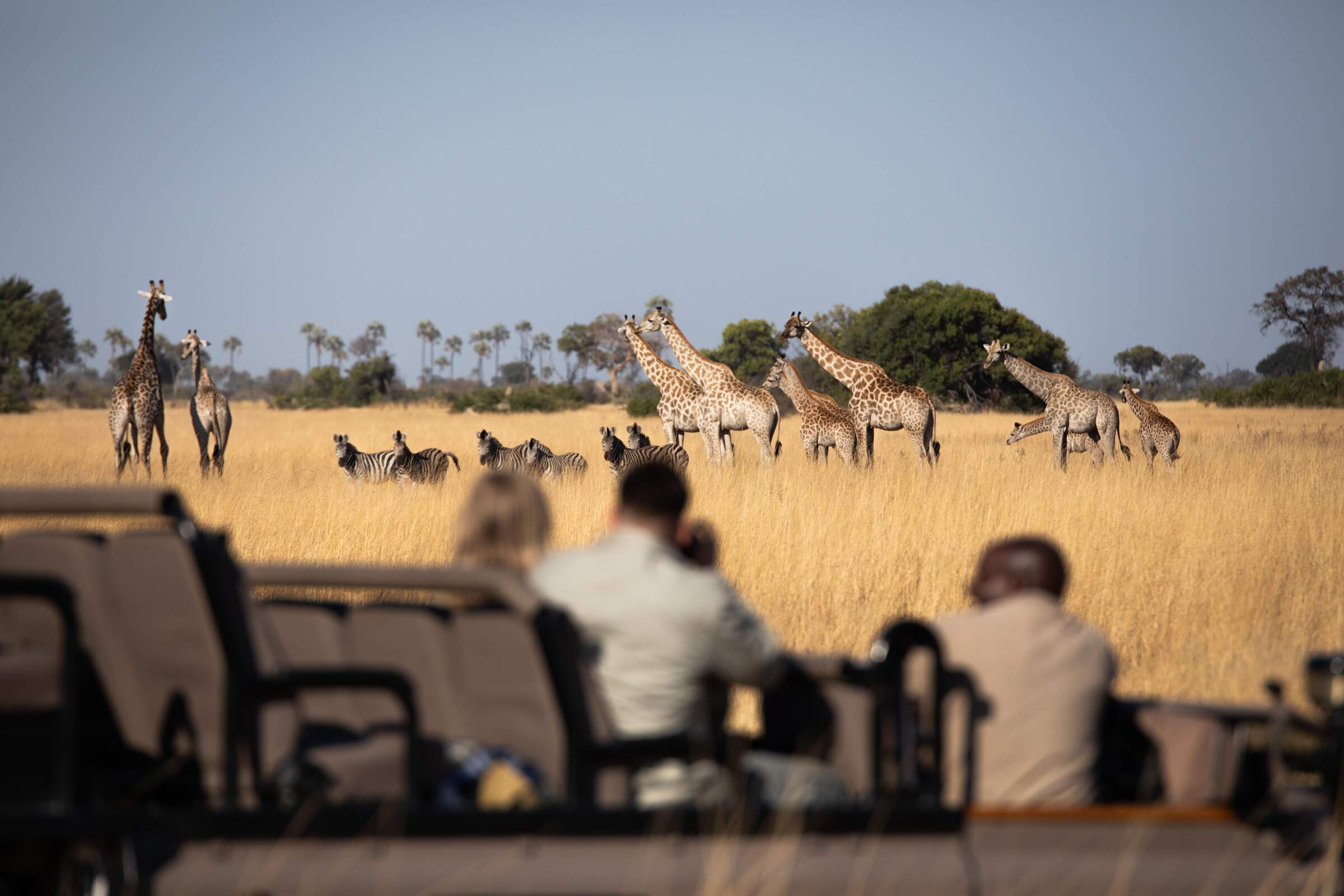
Tubu Tree Camp
A traditional tented camp with a distinctive tree-house feel, Tubu Tree offers some of the best game viewing in the Jao Reserve.
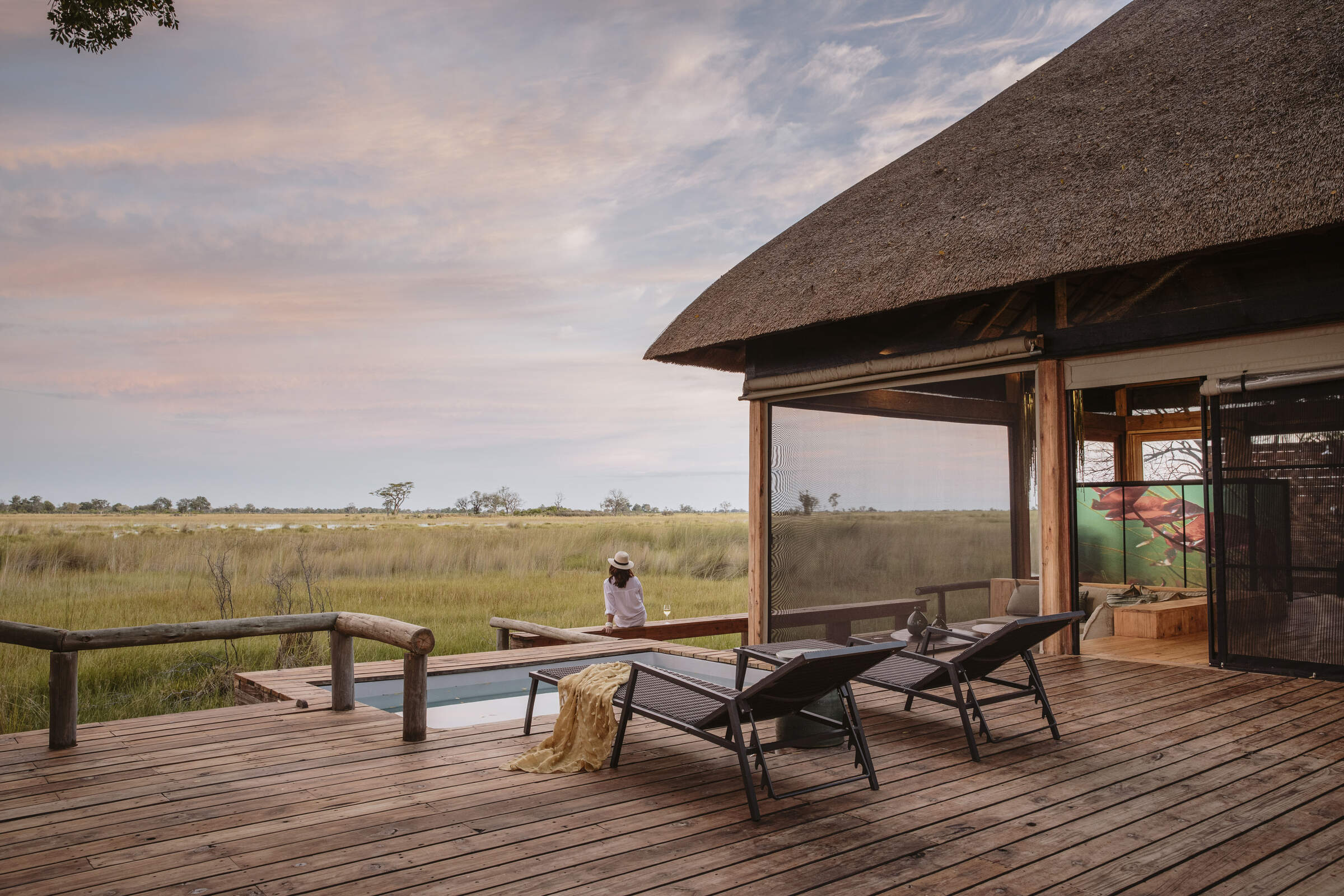
Vumbura Plains
Indulgently stylish and luxurious, Vumbura Plains offers superb game viewing and birding on an exceptionally varied private reserve.
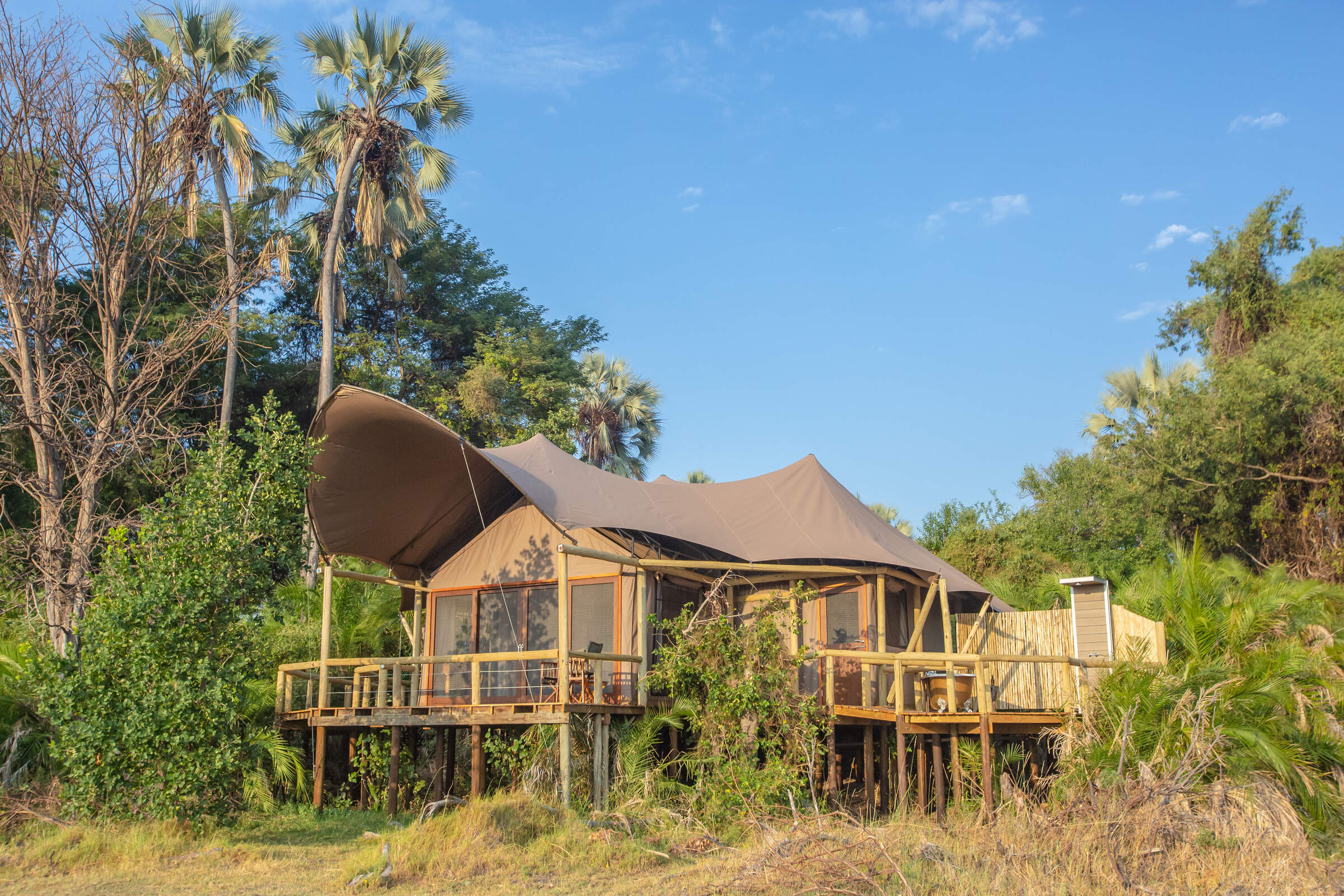
Jacana Camp
Jacana Camp is a small safari camp with an informal island feel; it is ideal for water-based activities in the Delta and offers excellent birdwatching.
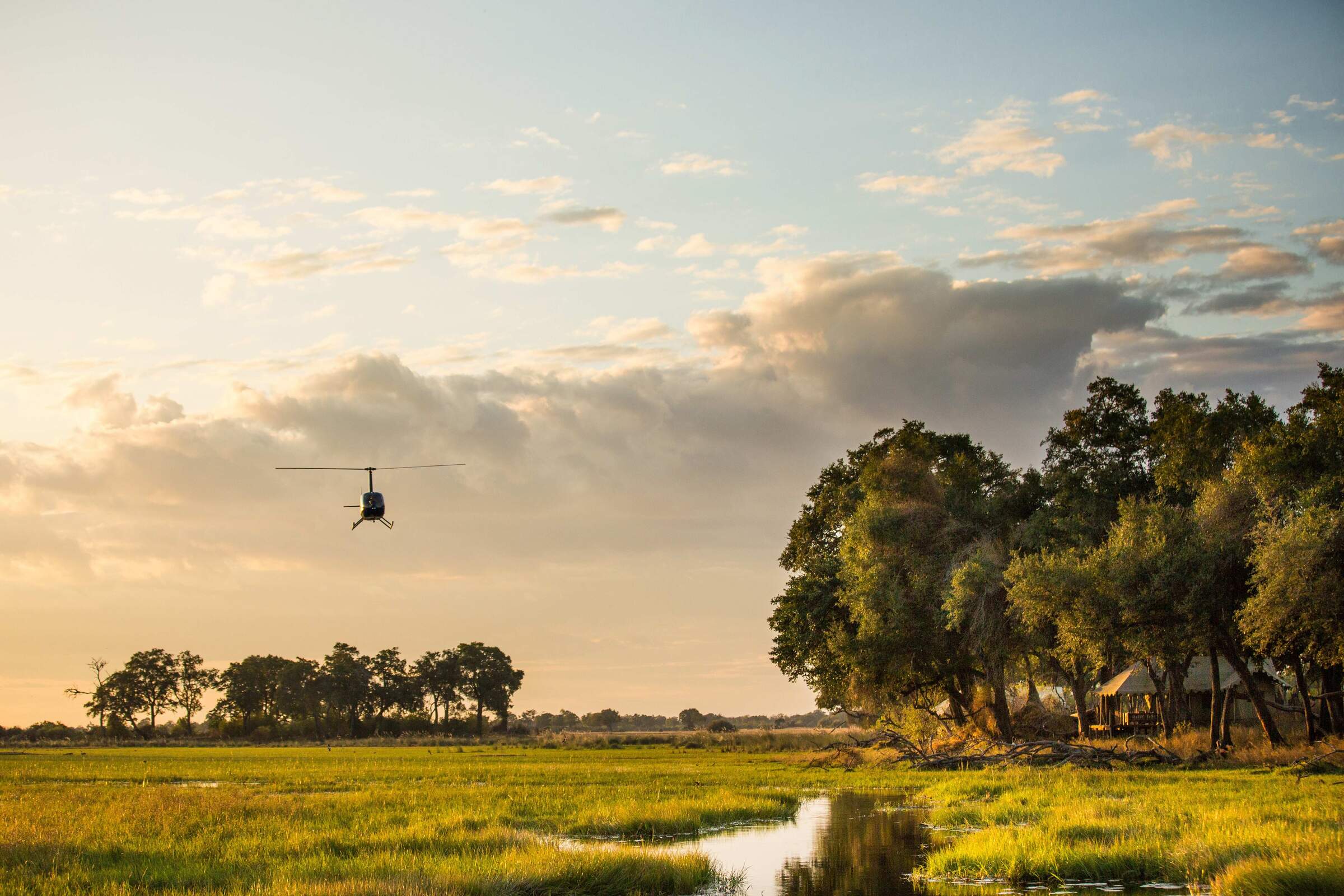
Duba Explorers Camp
Intimate and elegant, Duba Explorers Camp promises a firm safari focus in a remote corner of the Okavango, led by a team who value the highest guiding and hosting standards.
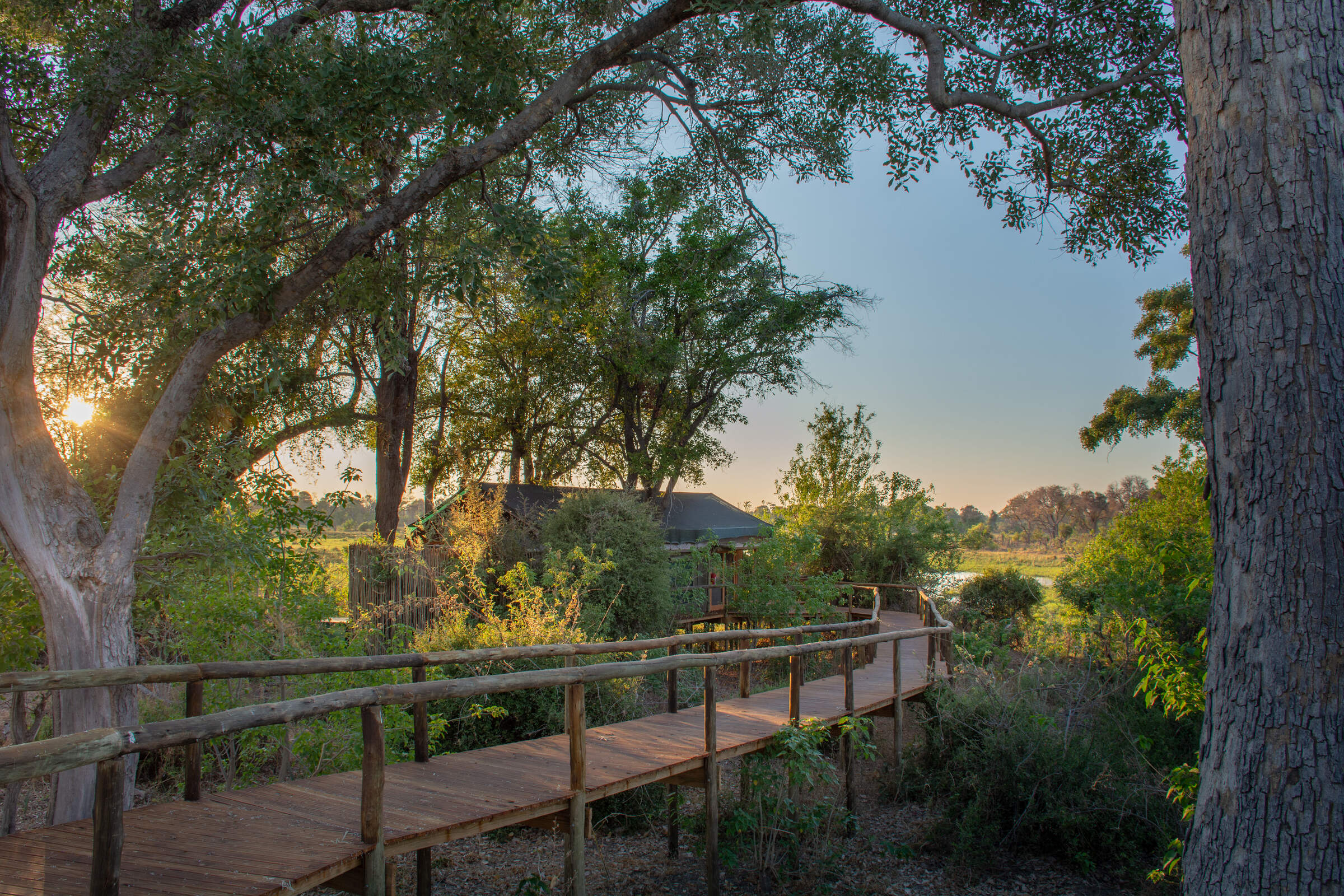
Mma Dinare
Beautifully located in a private concession overlooking the Gomoti River, the traditional Mma Dinare is very well-priced for the Okavango Delta.
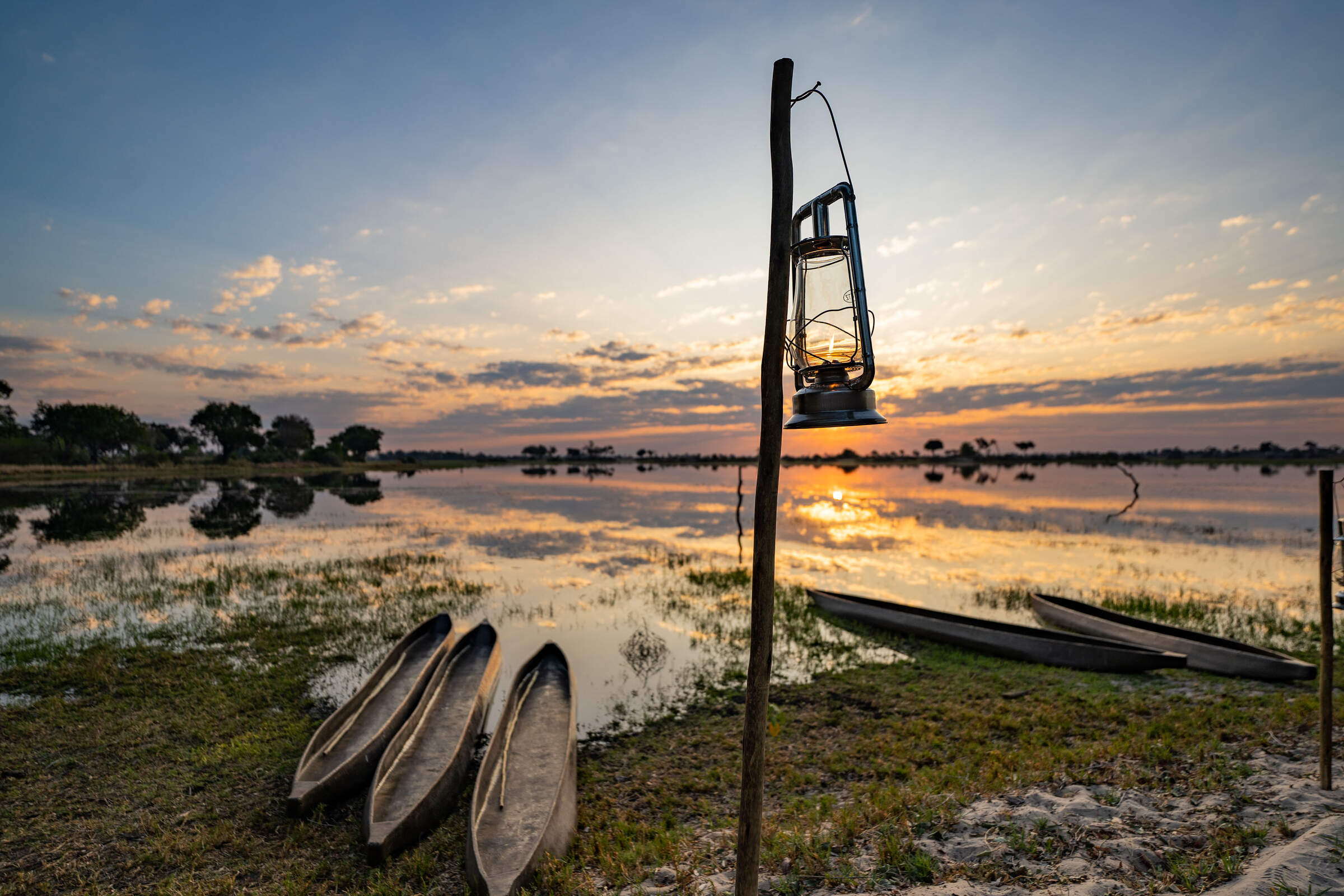
Pom Pom Camp
Amidst stunning Okavango Delta scenery, Pom Pom offers idyllic mokoro trips in season, great birdwatching, and increasingly good big-game sightings, especially leopards.
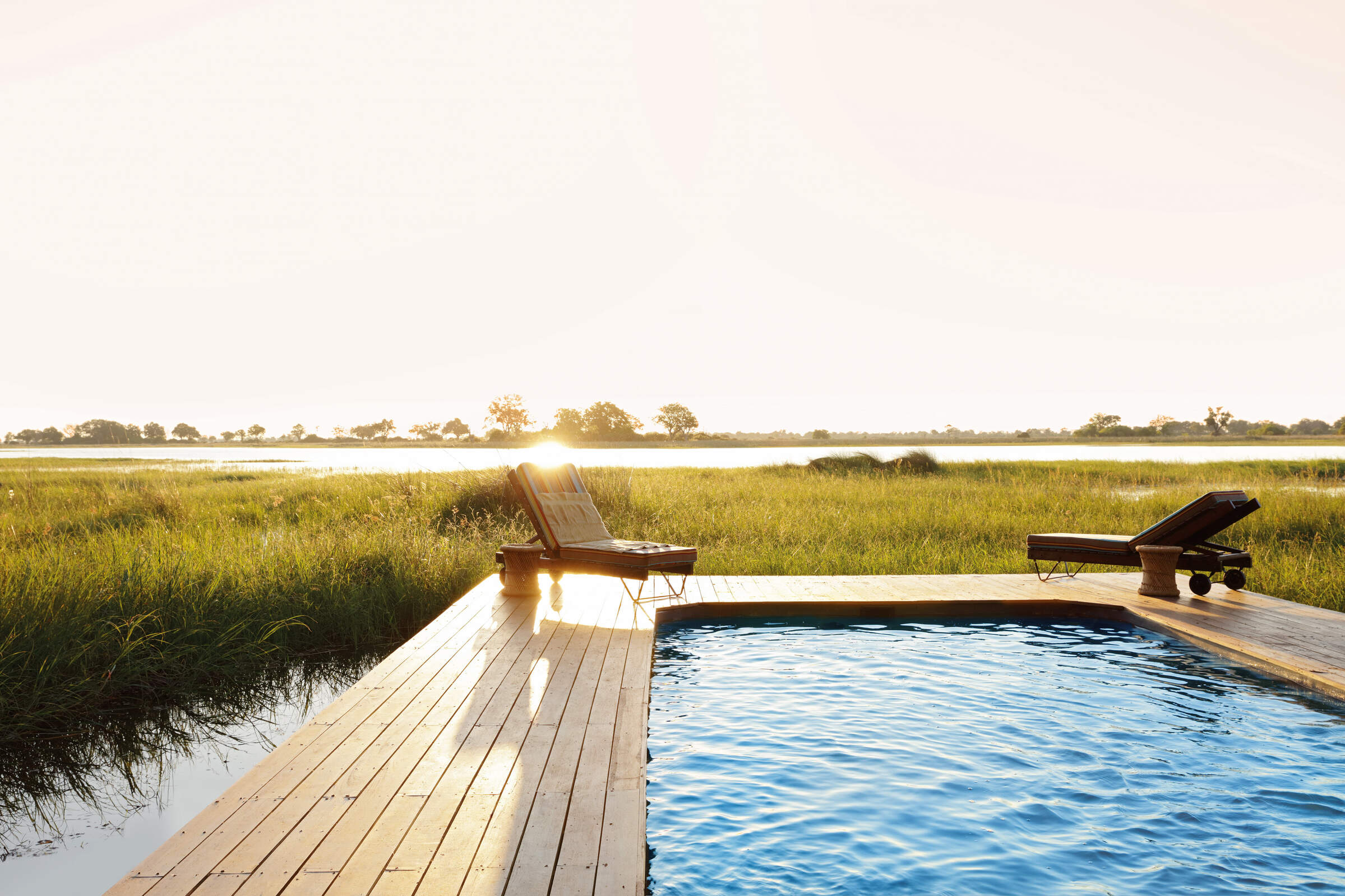
Mapula Lodge
For an affordable yet varied safari encompassing a range of eco-systems, the traditional Mapula Lodge takes a lot of beating.
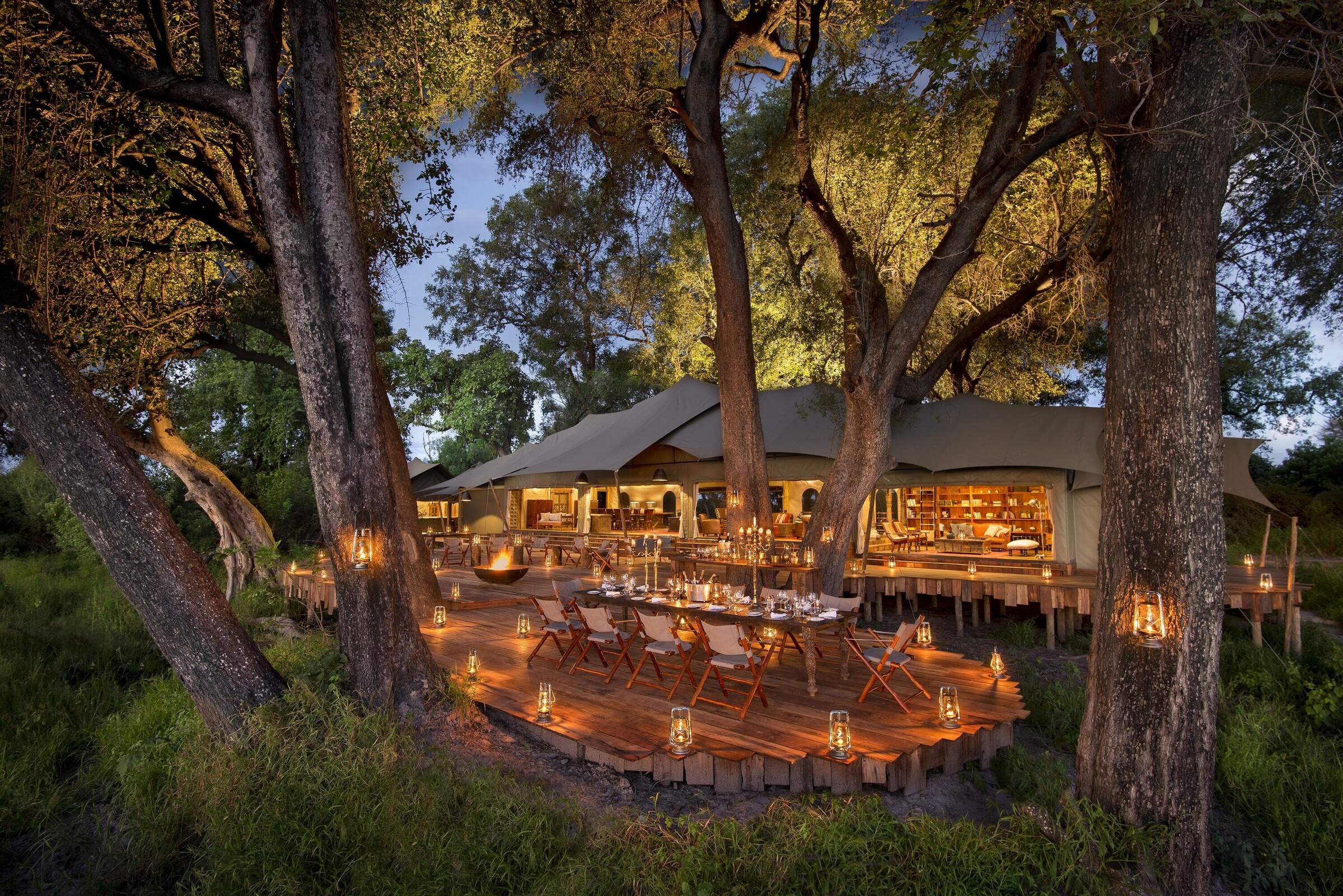
Duba Plains Camp
Duba Plains Camp is a traditional yet luxurious safari camp, best known for the thrilling lion behavior interaction that is often see during the day.
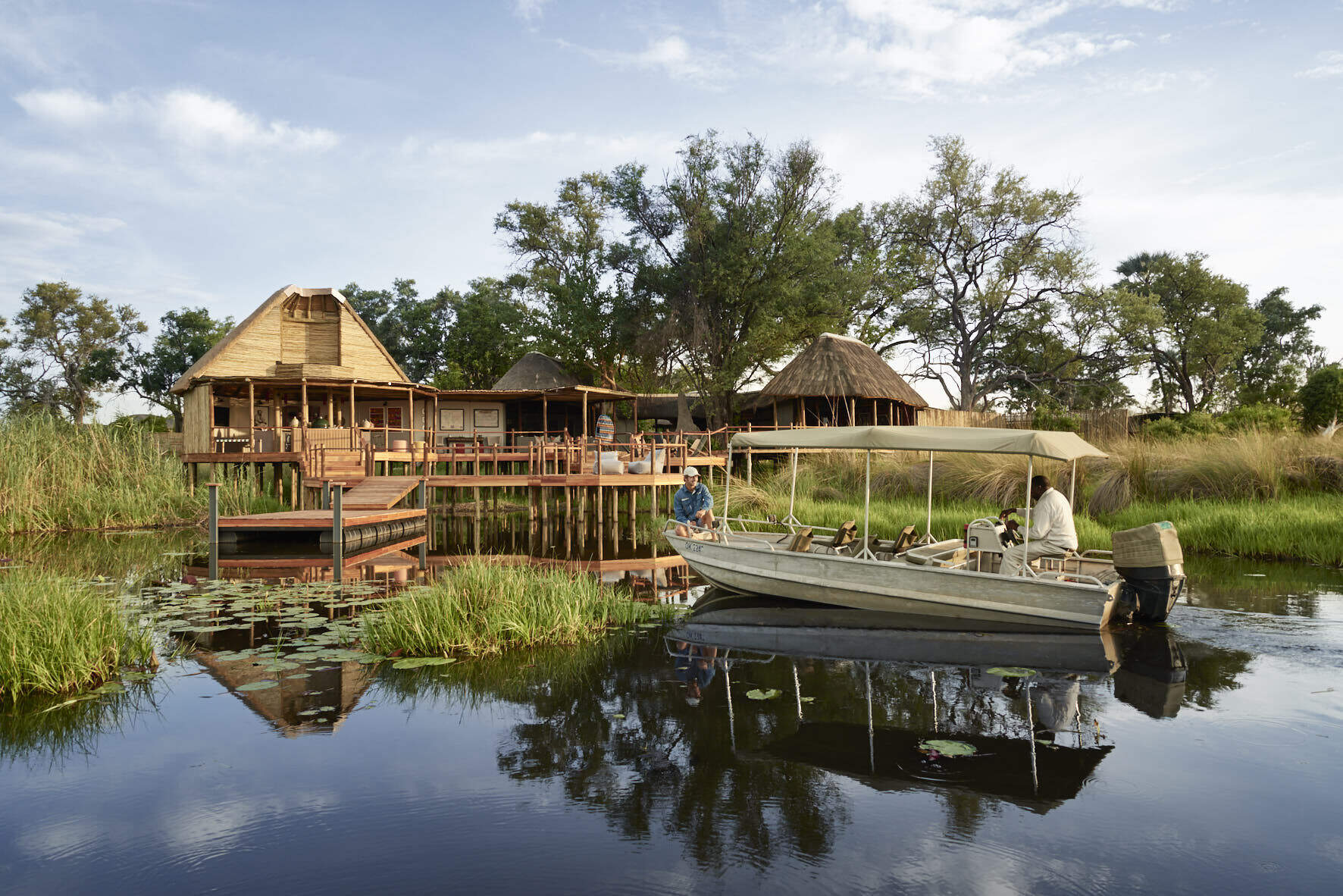
Baines' Camp
Baines' Camp is a well-run, intimate camp in a pretty part of the Okavango, offering a range of activities and the option to spend a morning walking with elephants.
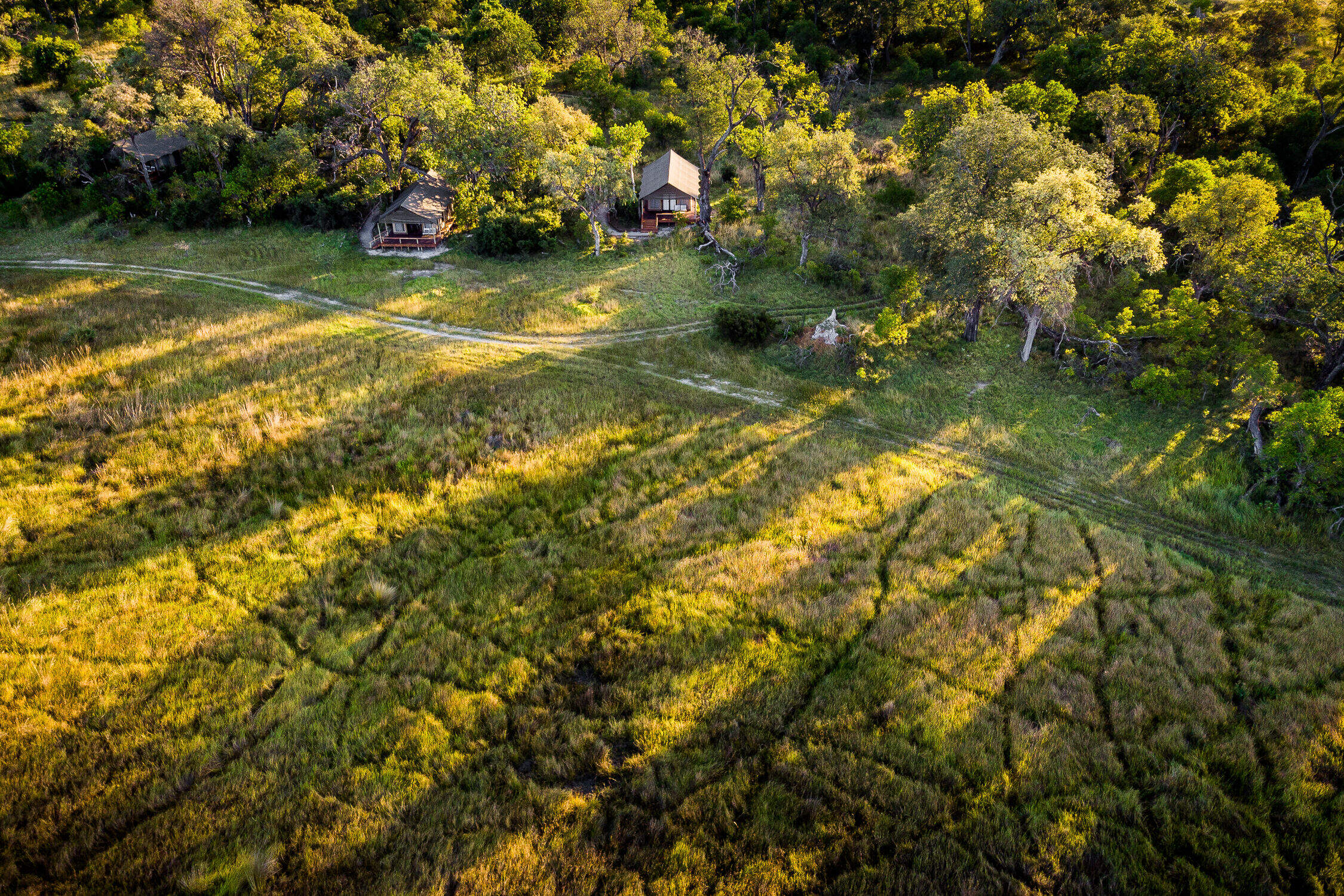
Stanley's Camp
In a private concession south of Moremi Game Reserve, Stanley's Camp offers 4WD game drives, seasonal water activities and a superb elephant interaction.
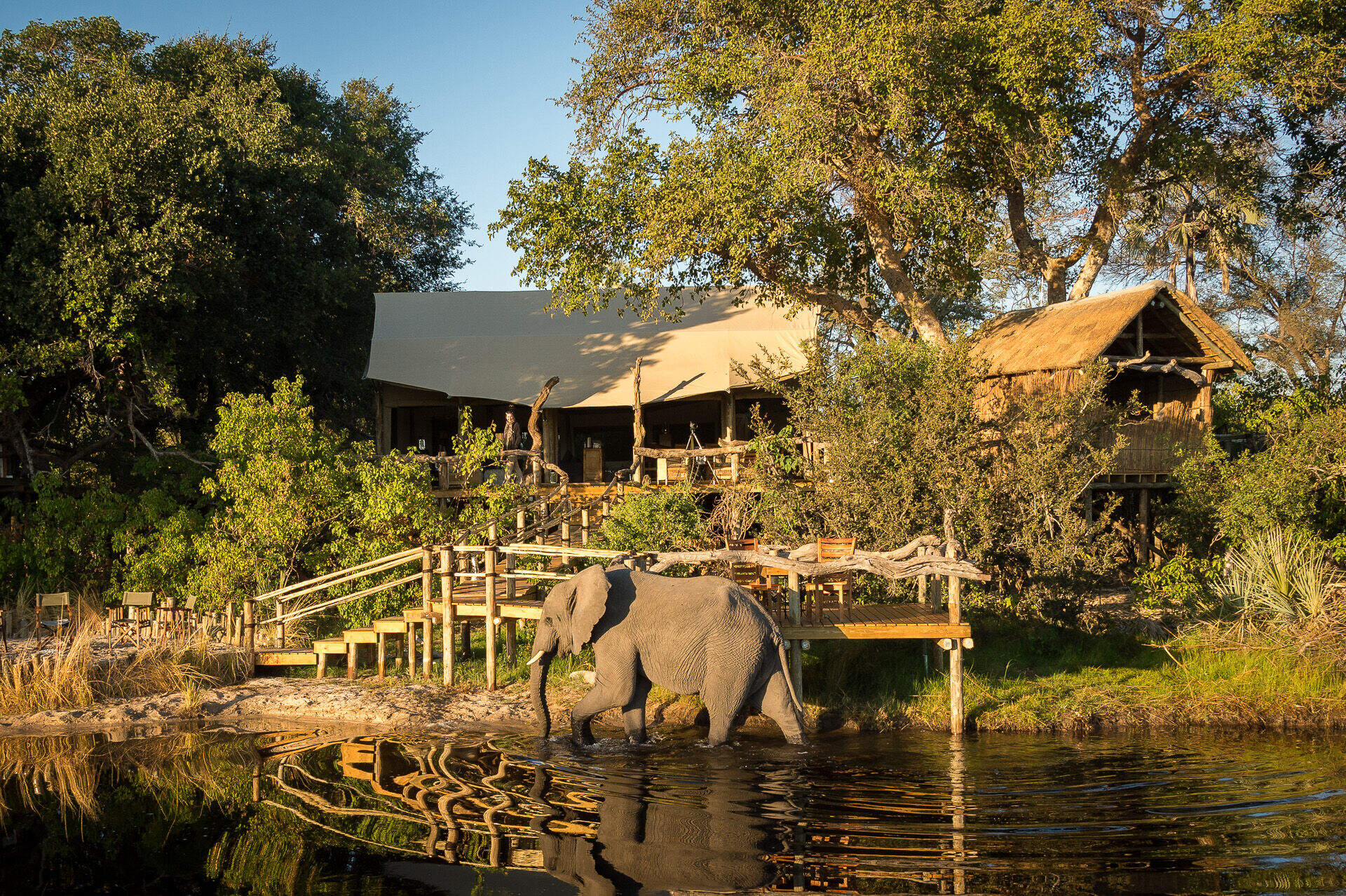
Little Tubu
Little Tubu is a new, traditional camp with just three tented chalets and a distinctive tree-house feel. The areas around it can be explored by water and land-based activities year round.
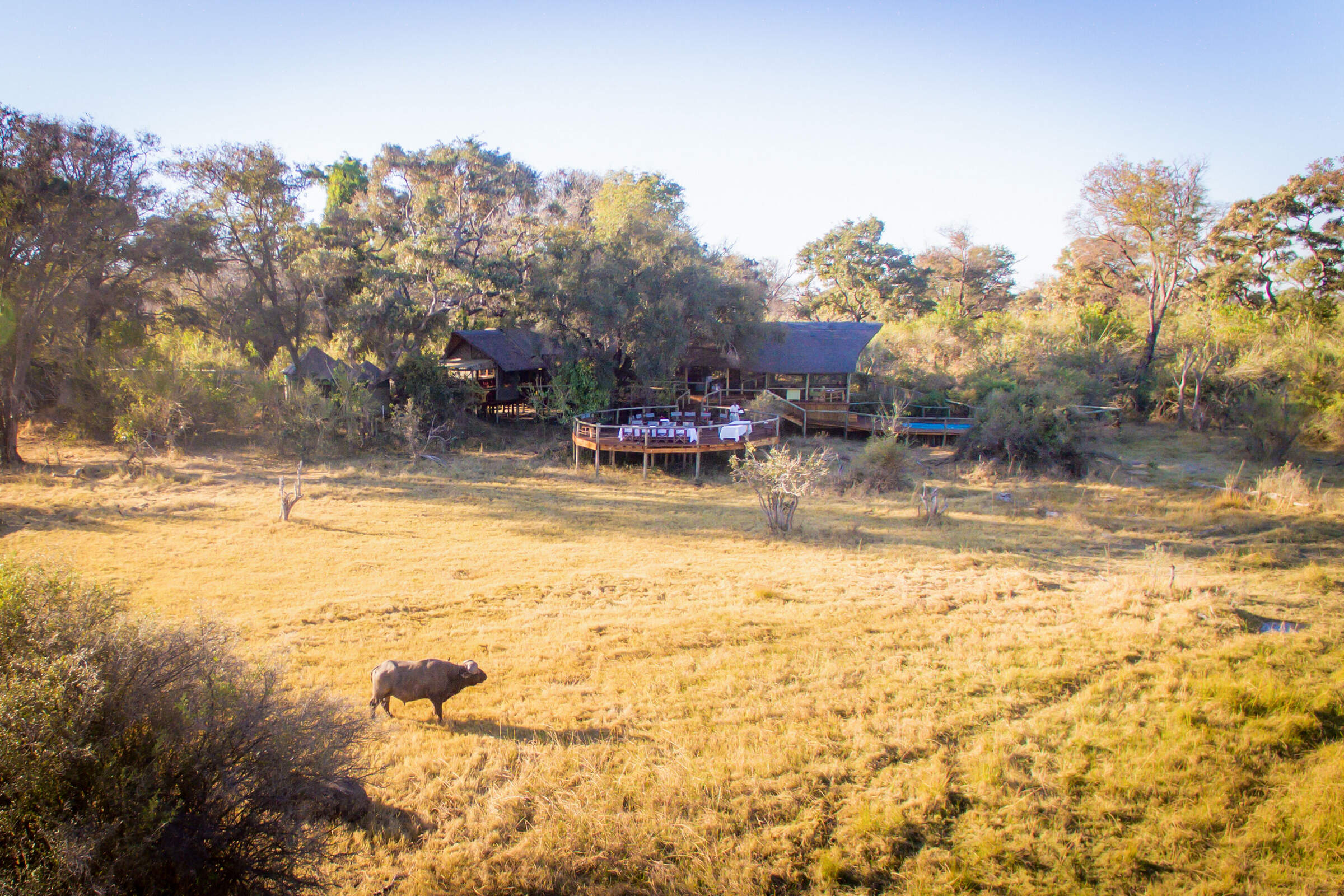
Rra Dinare
Located in a private concession in the southern reaches of the Okavango Delta, overlooking the Gomoti River, Rra Dinare is a traditional-style, well-priced camp.
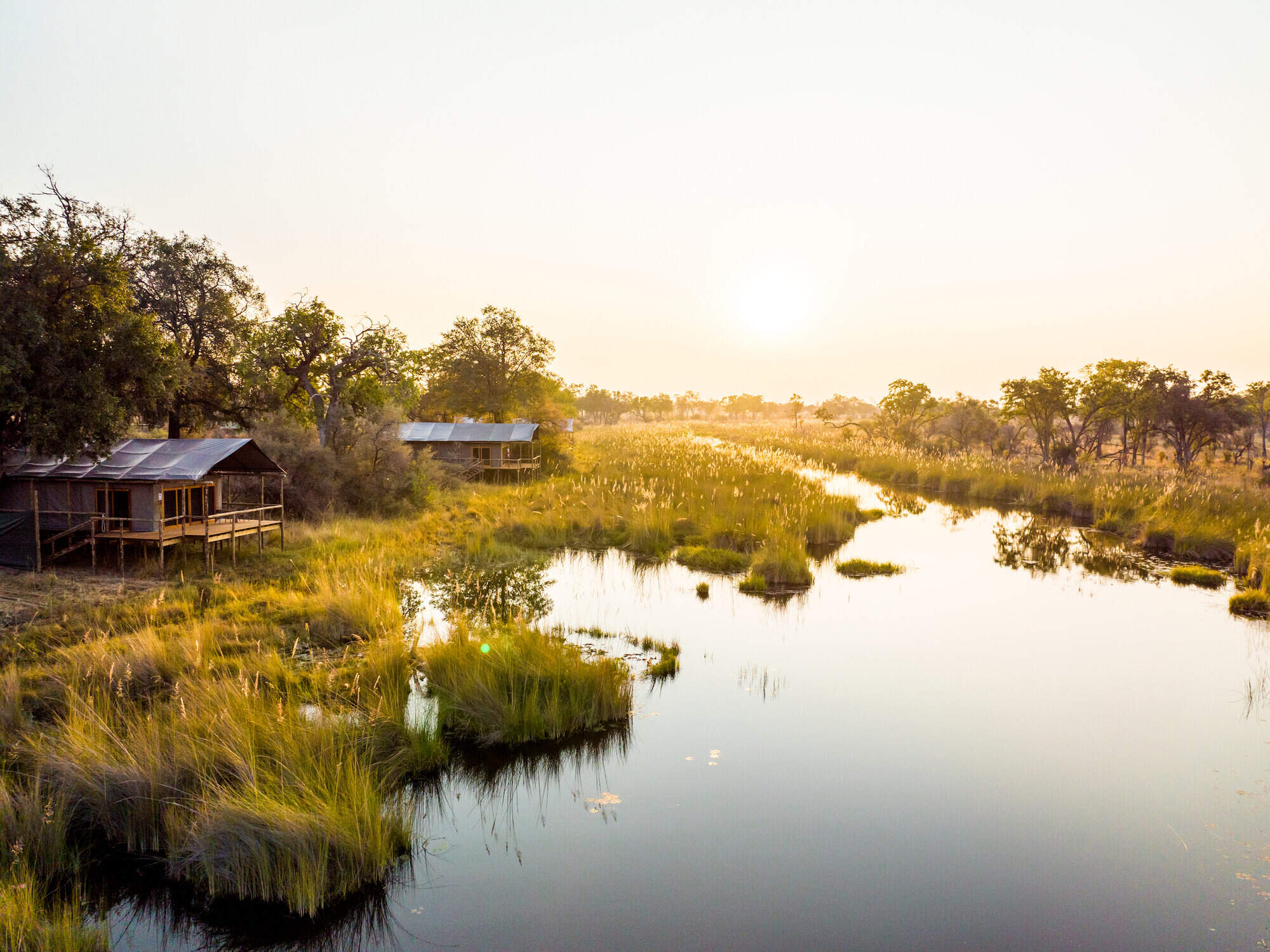
4 Rivers
4 Rivers is a new camp in a previously in accessible area of the excellent Kwara concession.
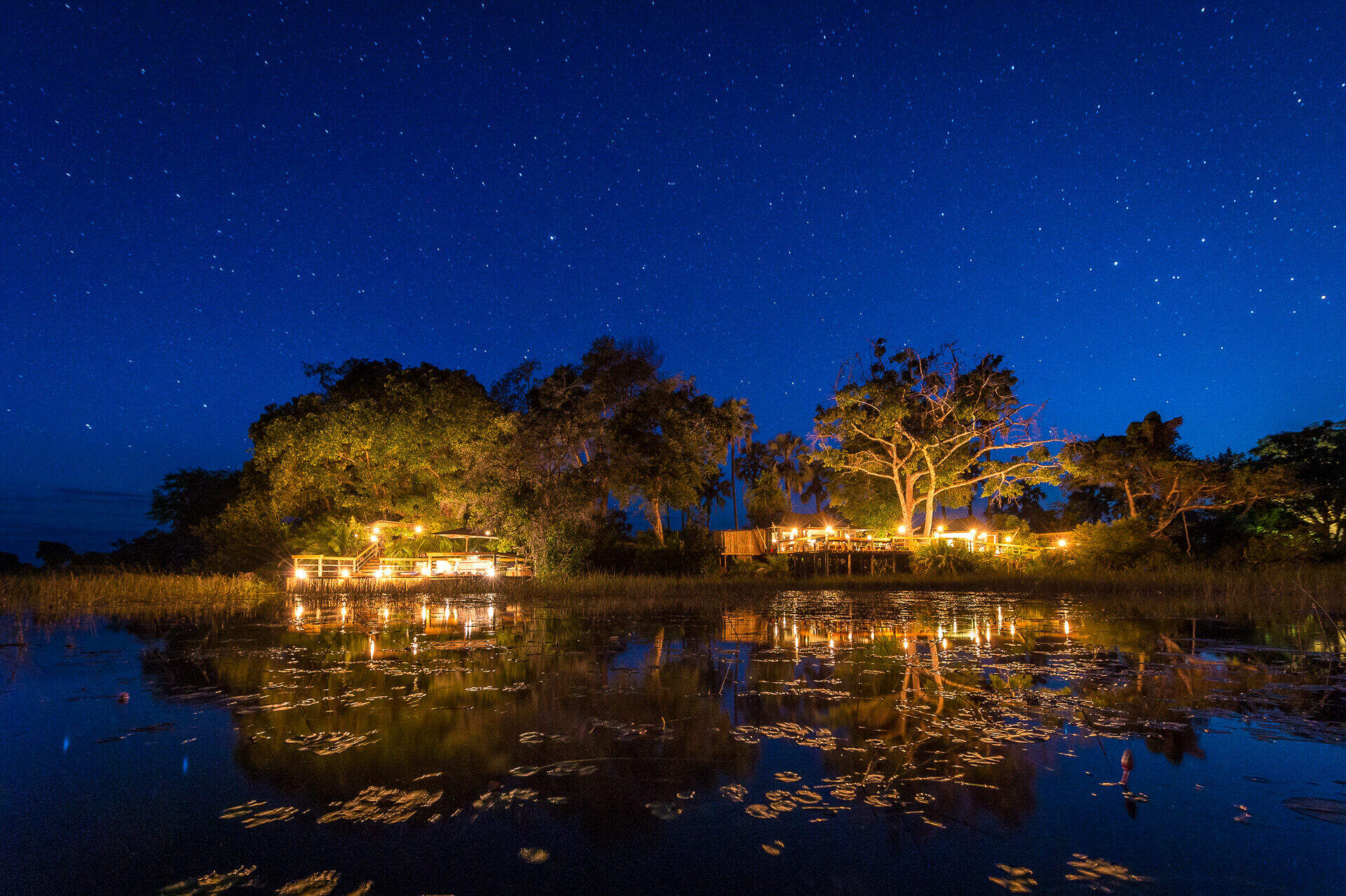
Pelo Camp
In a pristine wilderness environment deep in the Okavango Delta, the seasonal Pelo Camp is tented yet comfortable, with activities focusing on excursions by mokoro.
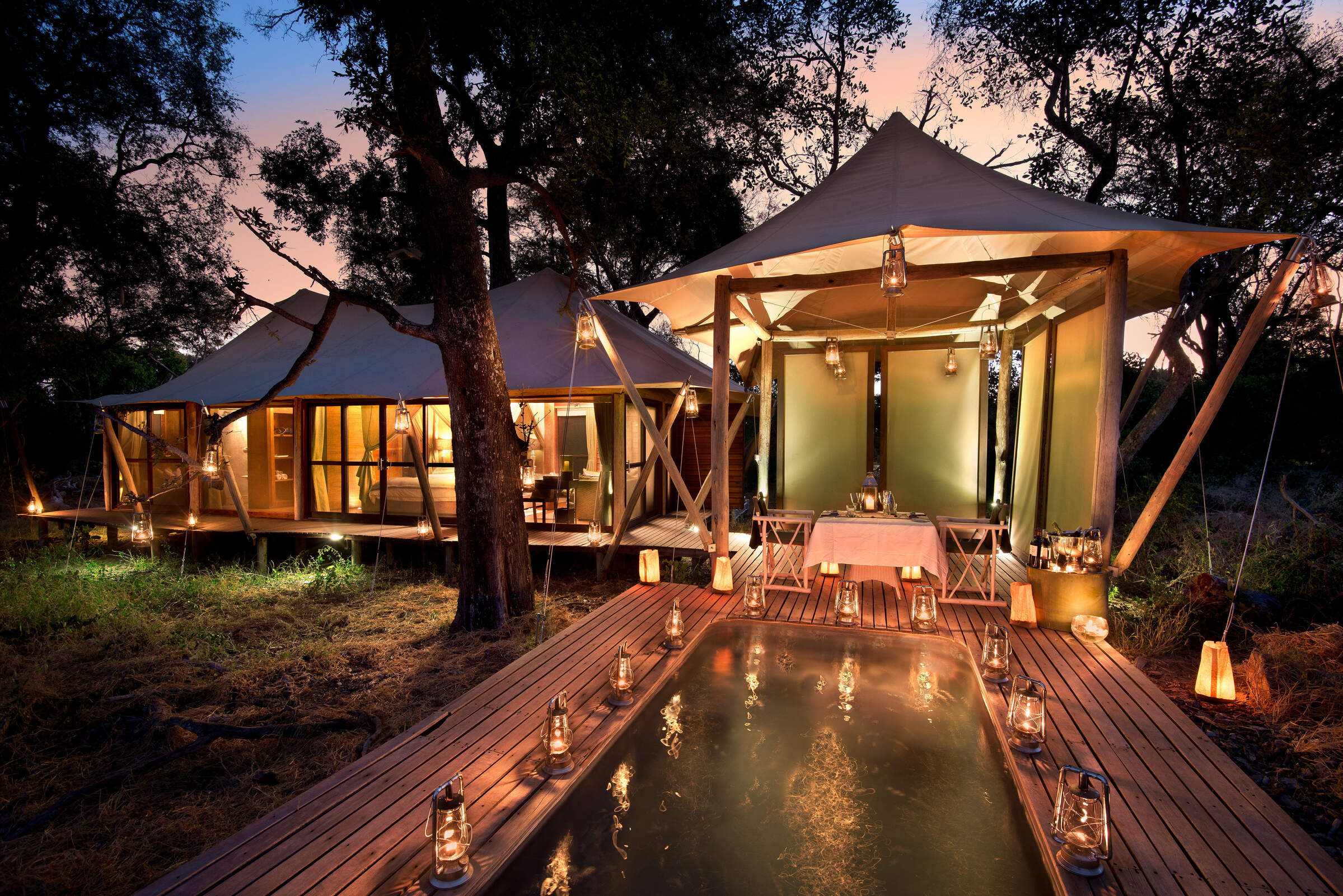
Xaranna
Xaranna is a plush tented camp amongst the idyllic waterways and islands of the Delta. Each air-conditioned tent has a plunge pool. Water activities and pampering are the focus here.
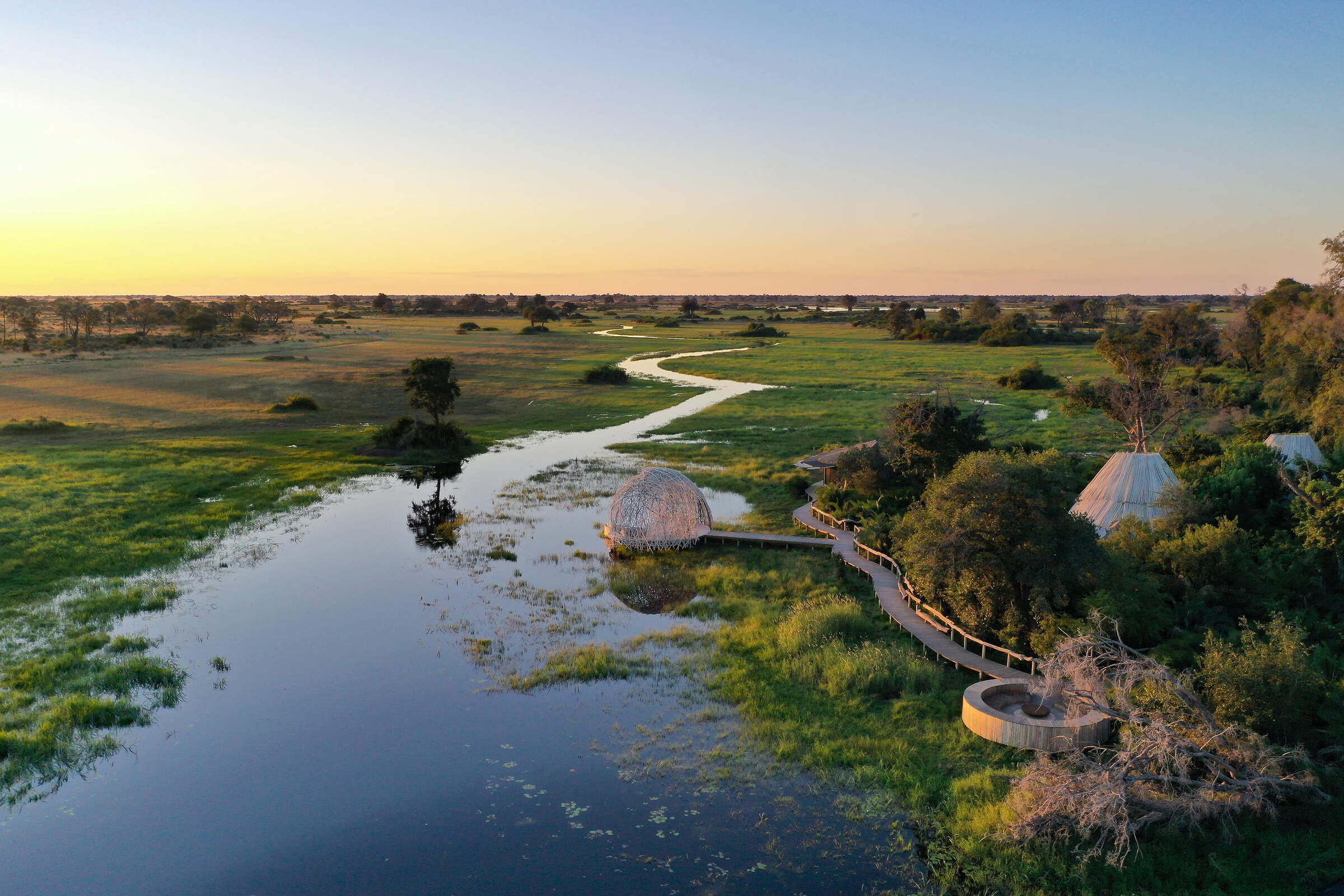
Jao Camp
In a beautiful area with fantastic water activities, Jao combines an idyllic location with high levels of luxury and service, and a top-end spa.
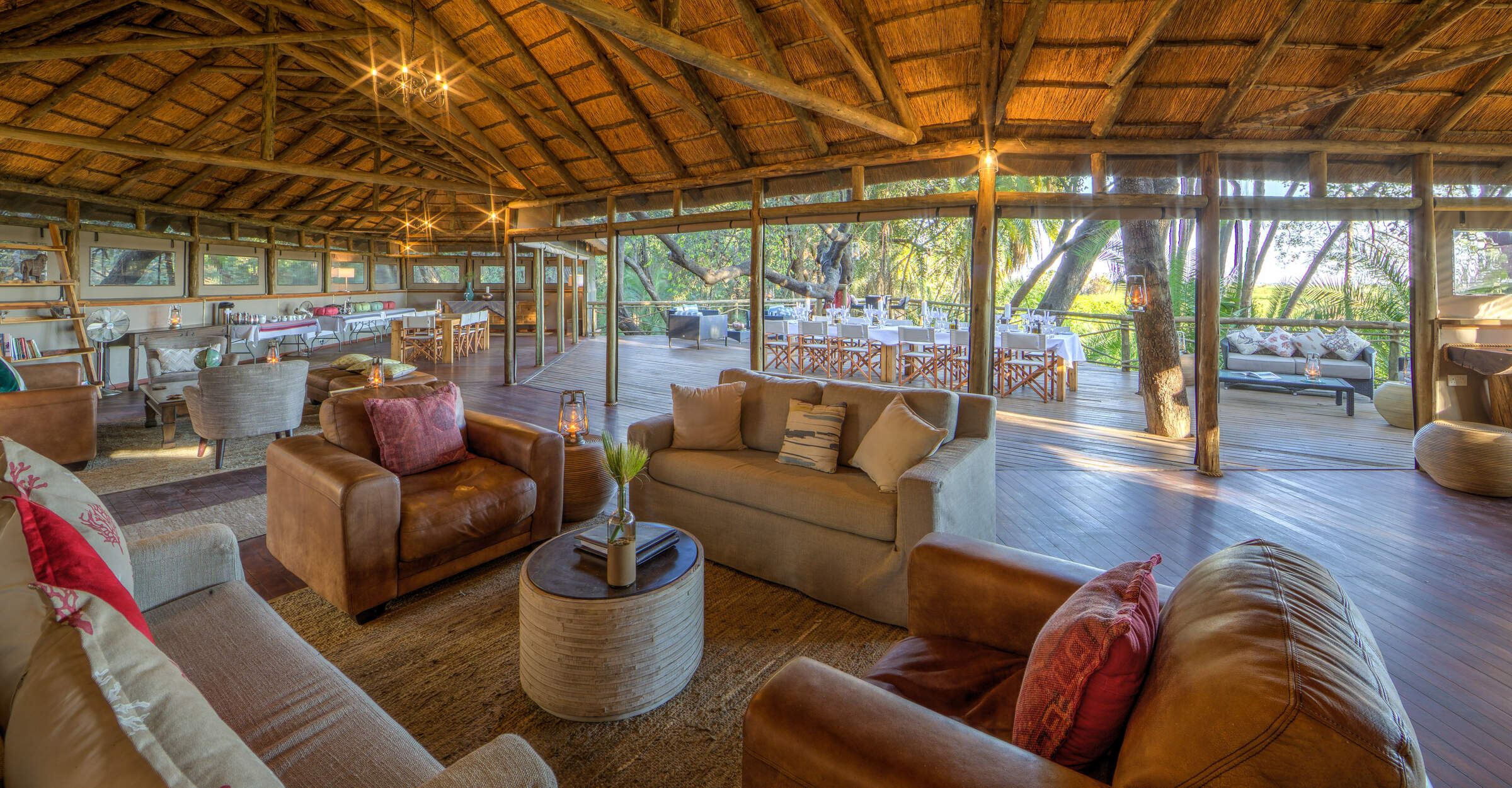
Setari Camp
Setari Camp stands on an island dotted with palm trees, close to the base of the Okavango's 'Panhandle", offering primarily water-based activities.
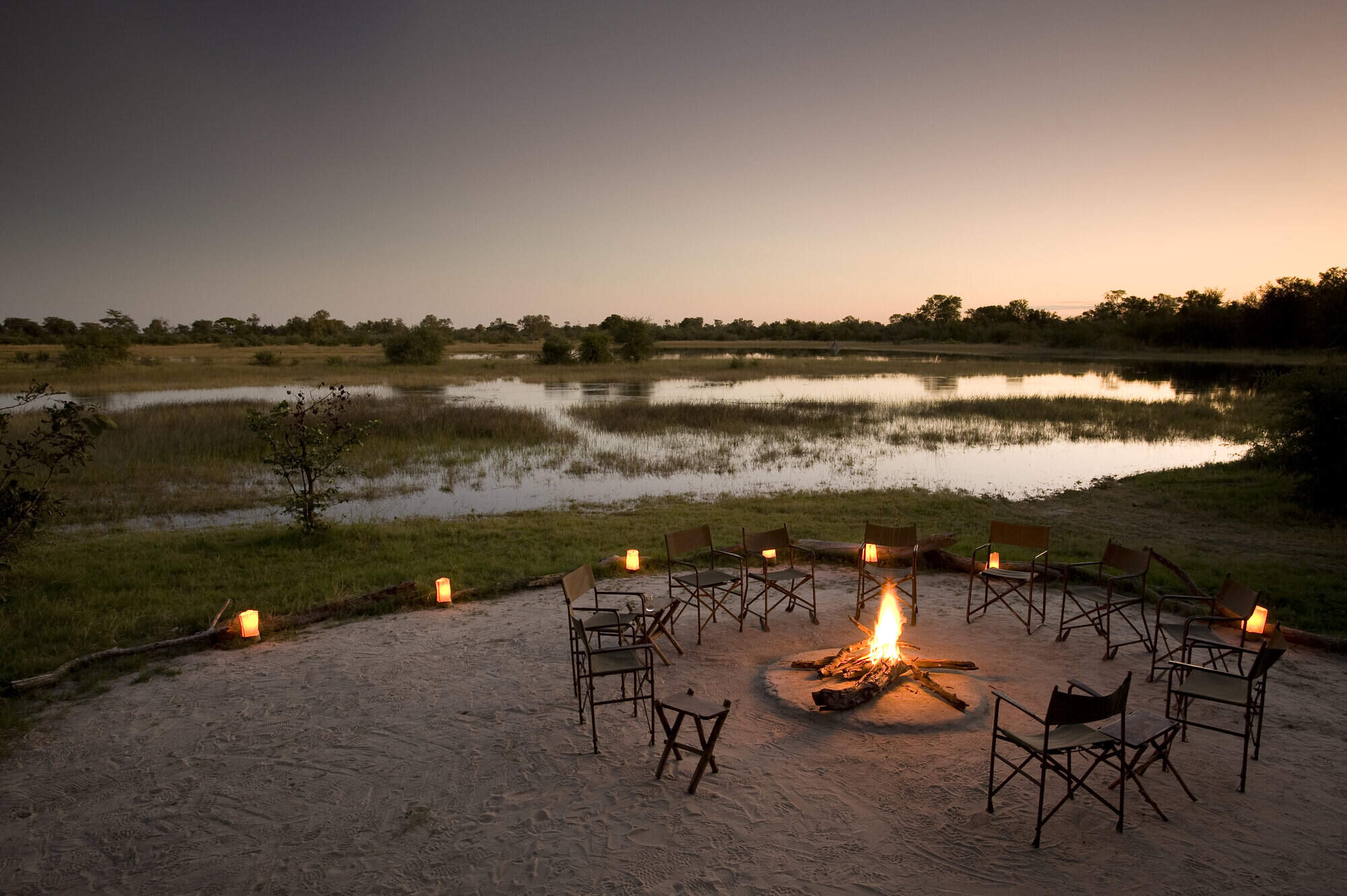
Okavango Explorers
The traditional, tented Okavango Explorers Camp offers a mix of walking, canoeing and game drives led by great guides in a wildlife-rich area.
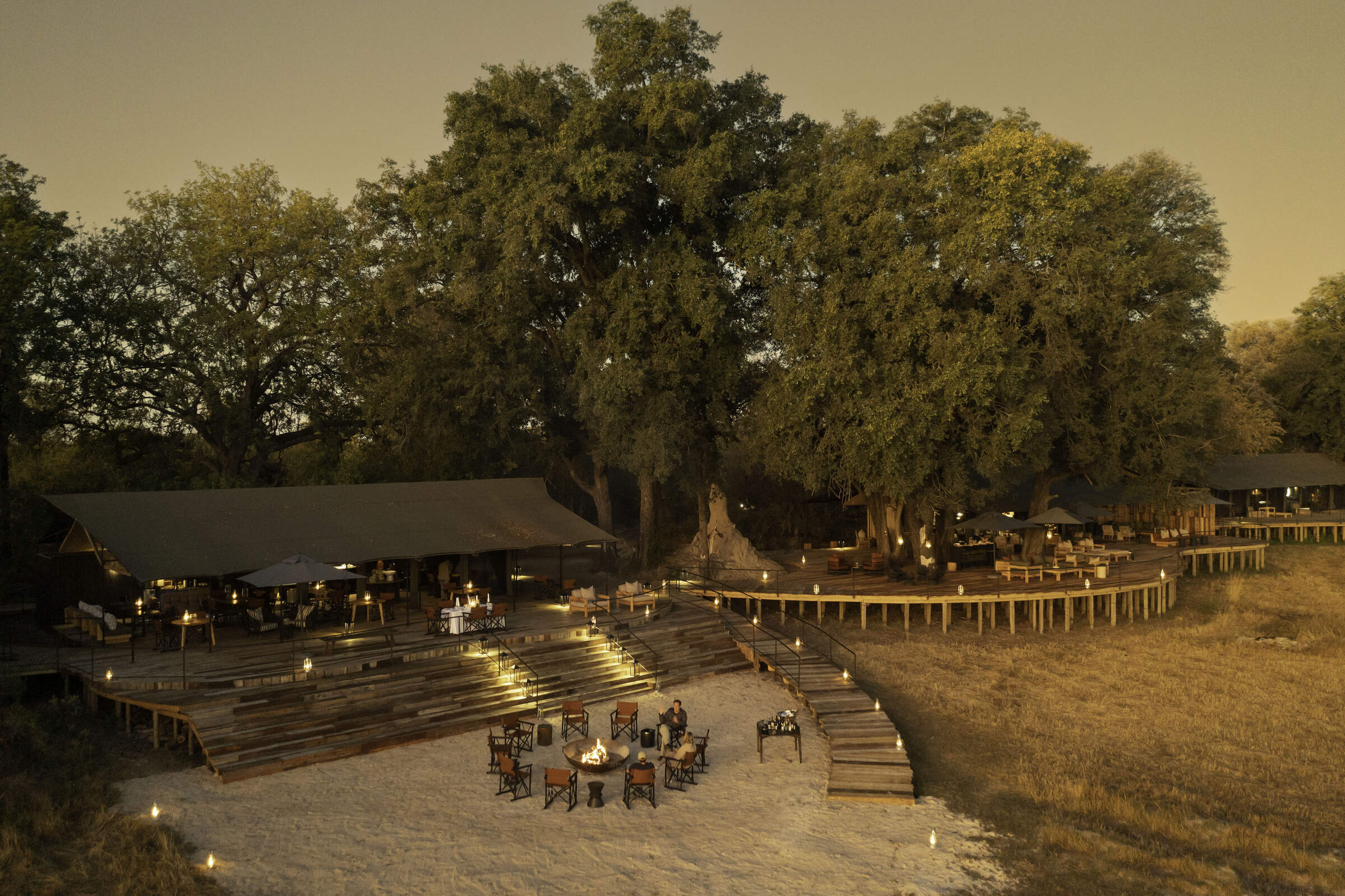
Kiri Camp
Kiri Camp is the latest Okavango offering from the excellent team behind Machaba. In an exciting new location in the heart of the Delta we cannot wait to visit this new camp.
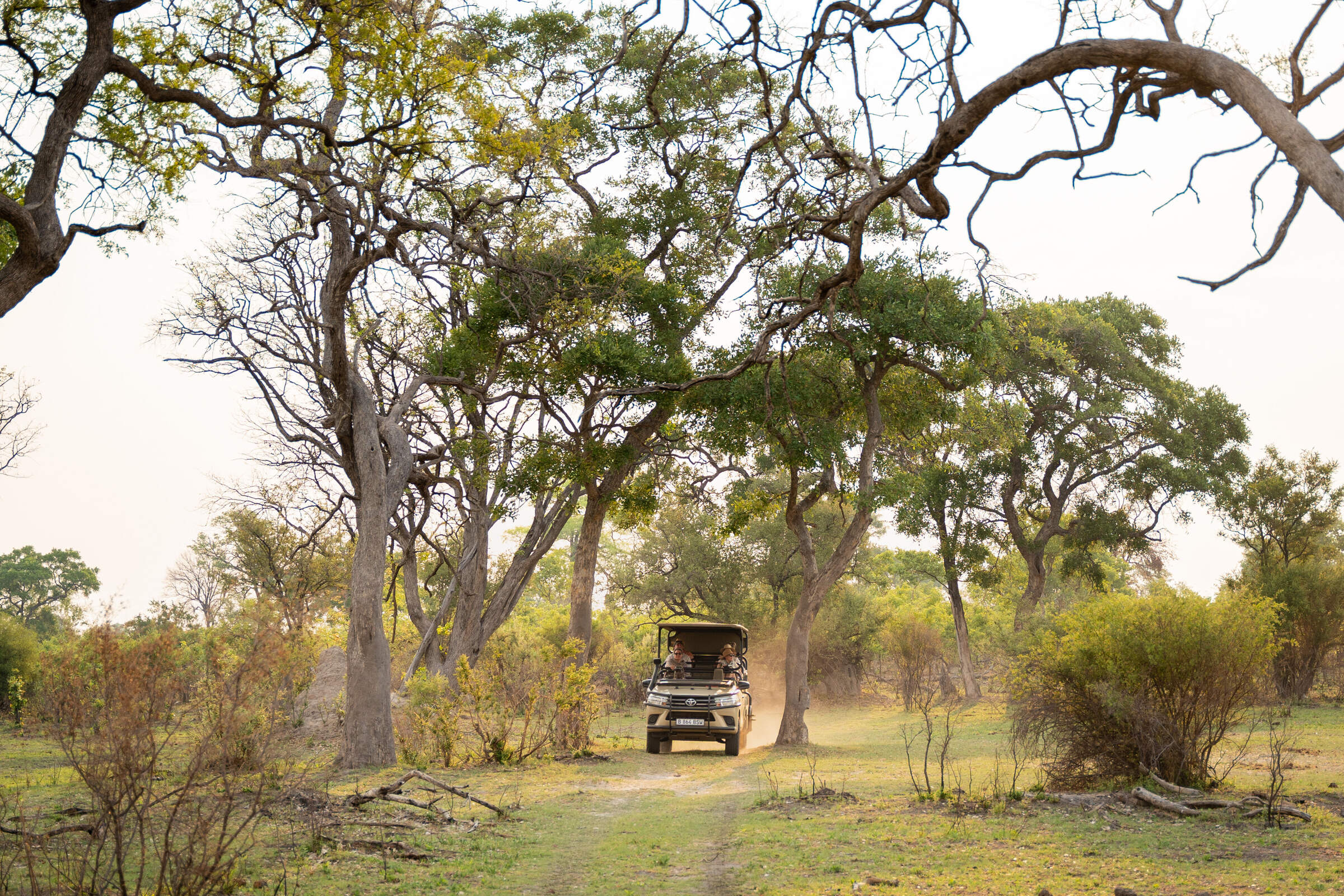
Karangoma
New for 2024, Karangoma is a classic, tented camp offering walking, canoeing and game drives, in partnership with the local Bukakwe San clan.
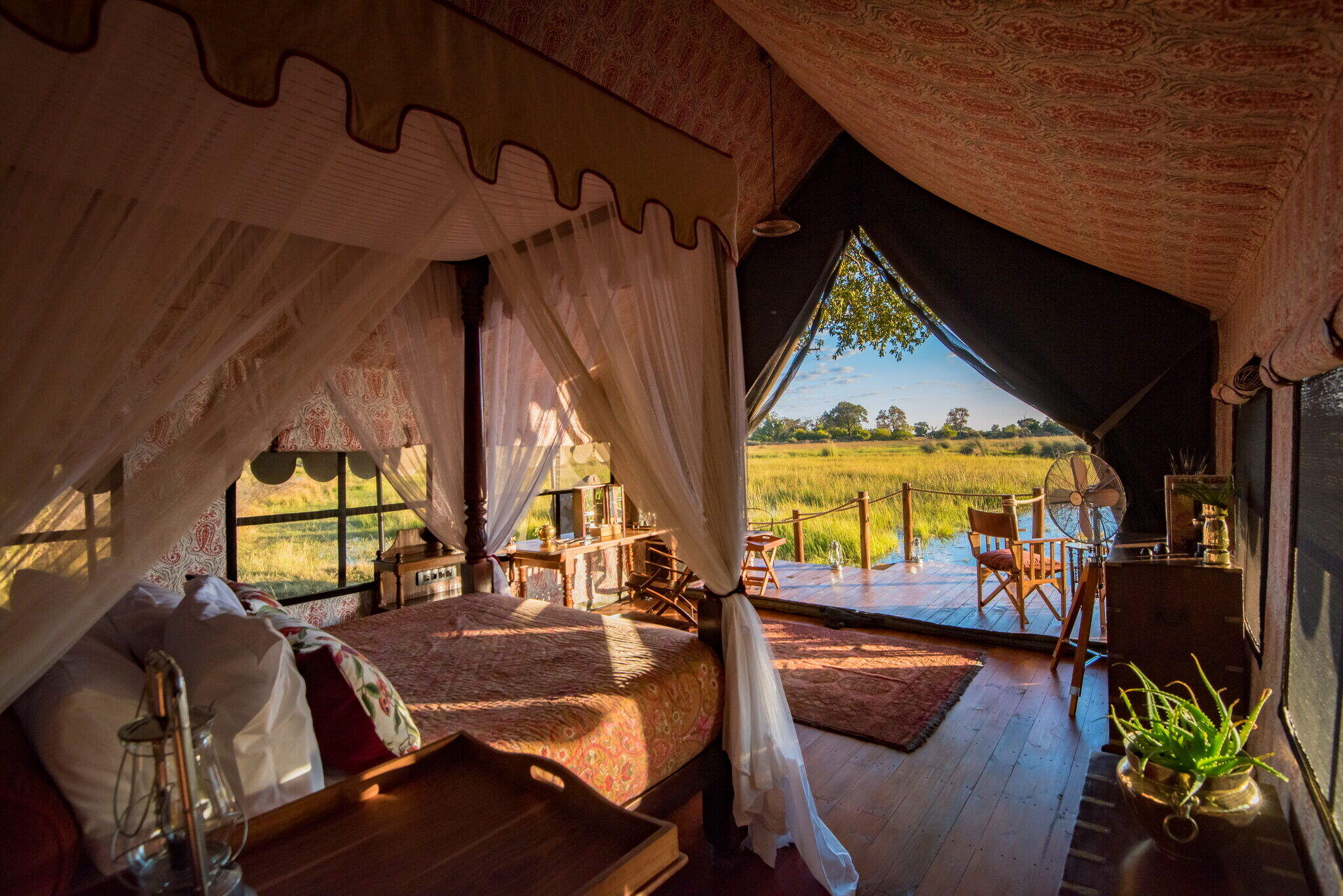
Duke’s Camp
On a remote island within a large concession, the romantic Duke's Camp and smaller Duke’s East are nestled among mature trees overlooking wildlife-rich plains and waterways of the Okavango.
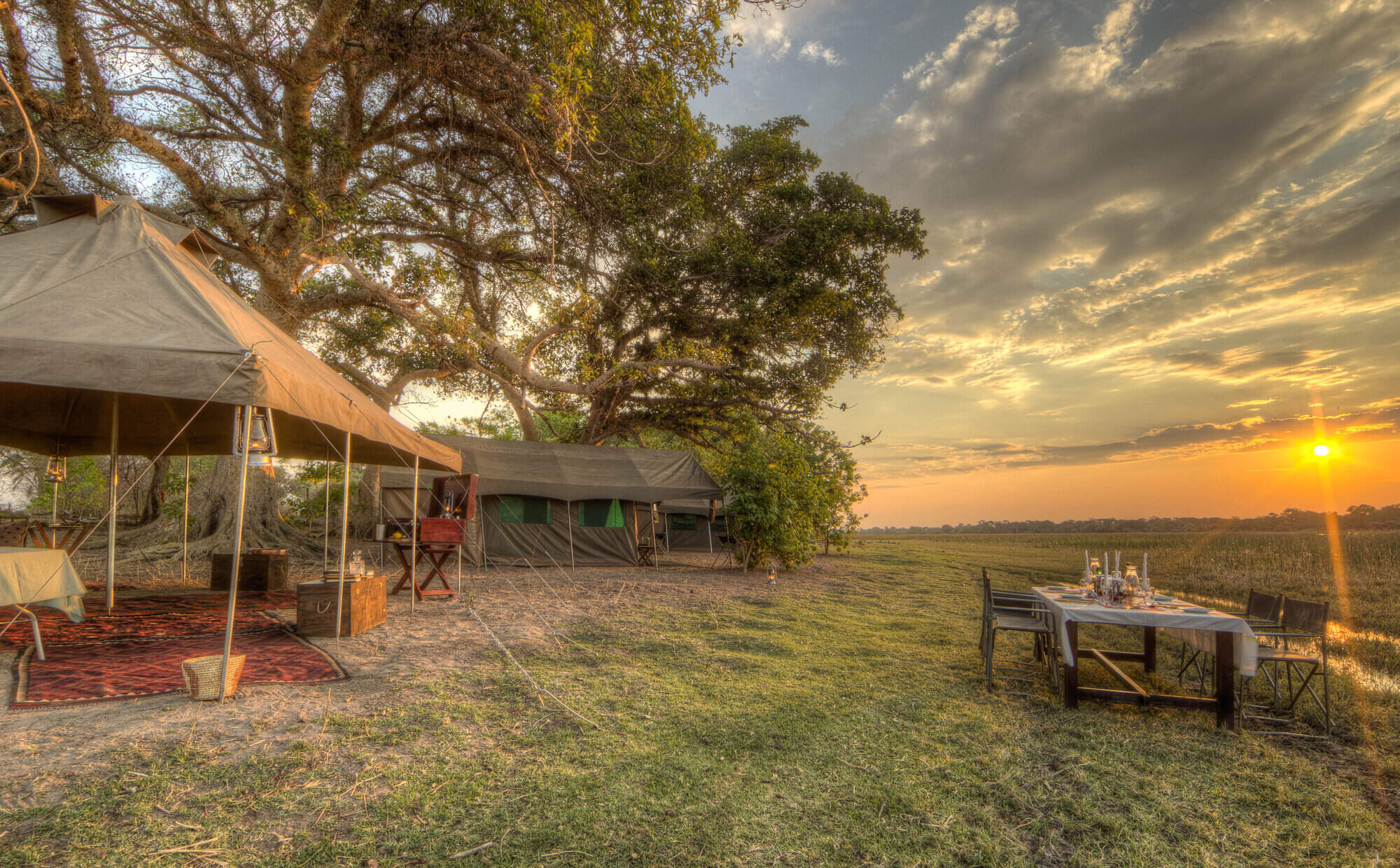
Okavango Walking Safari
The Okavango Delta Walking Safari camps in a secluded Okavango Delta Reserve where there are few roads; the ideal location for a walking trail led by an expert guide.
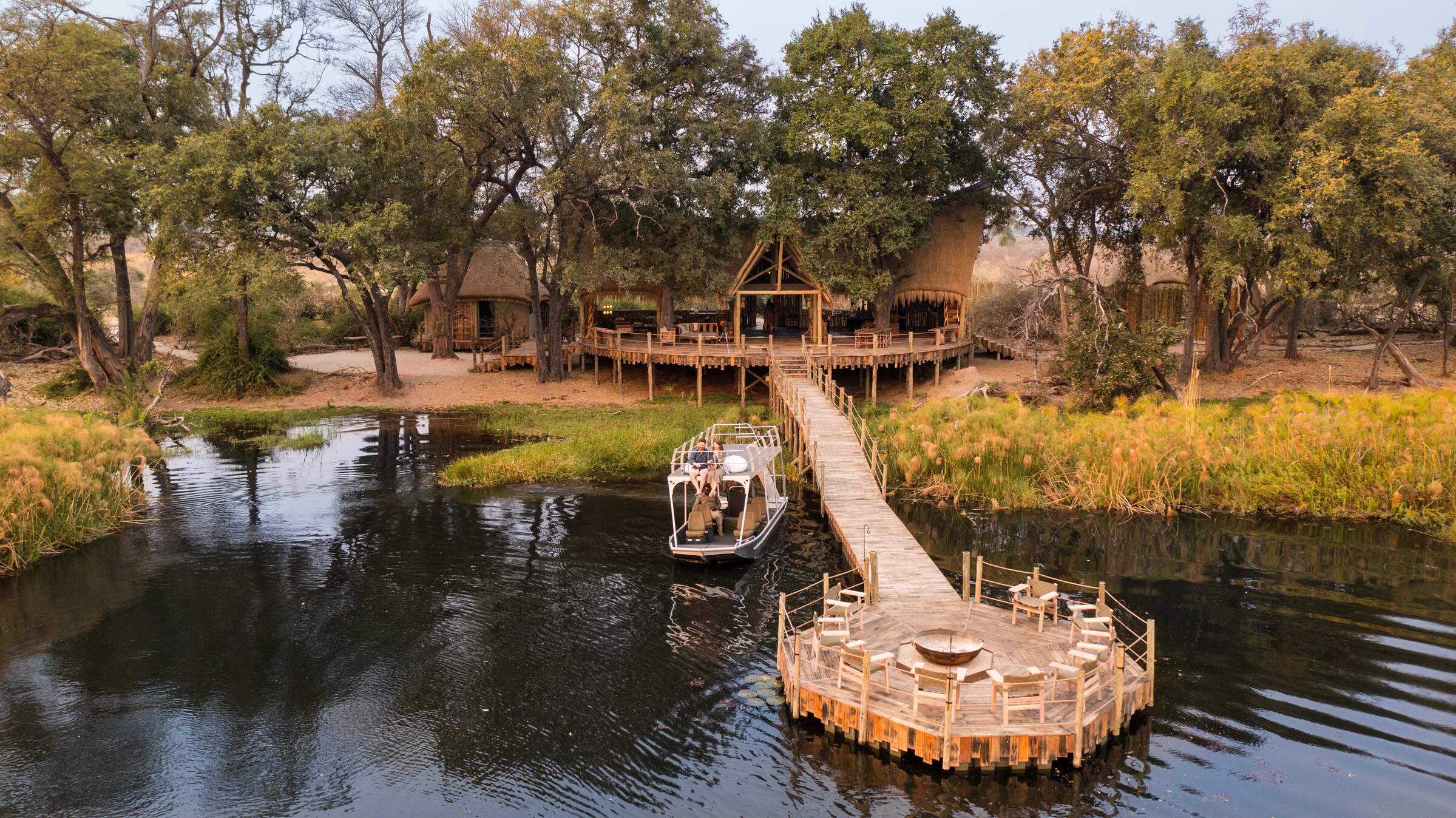
Sitatunga Island Camp
Tucked away in a pristine corner of the Okavango Delta, the exclusive Sitatunga Private Island is a water-based camp offering boating, mokoro trips and fishing.
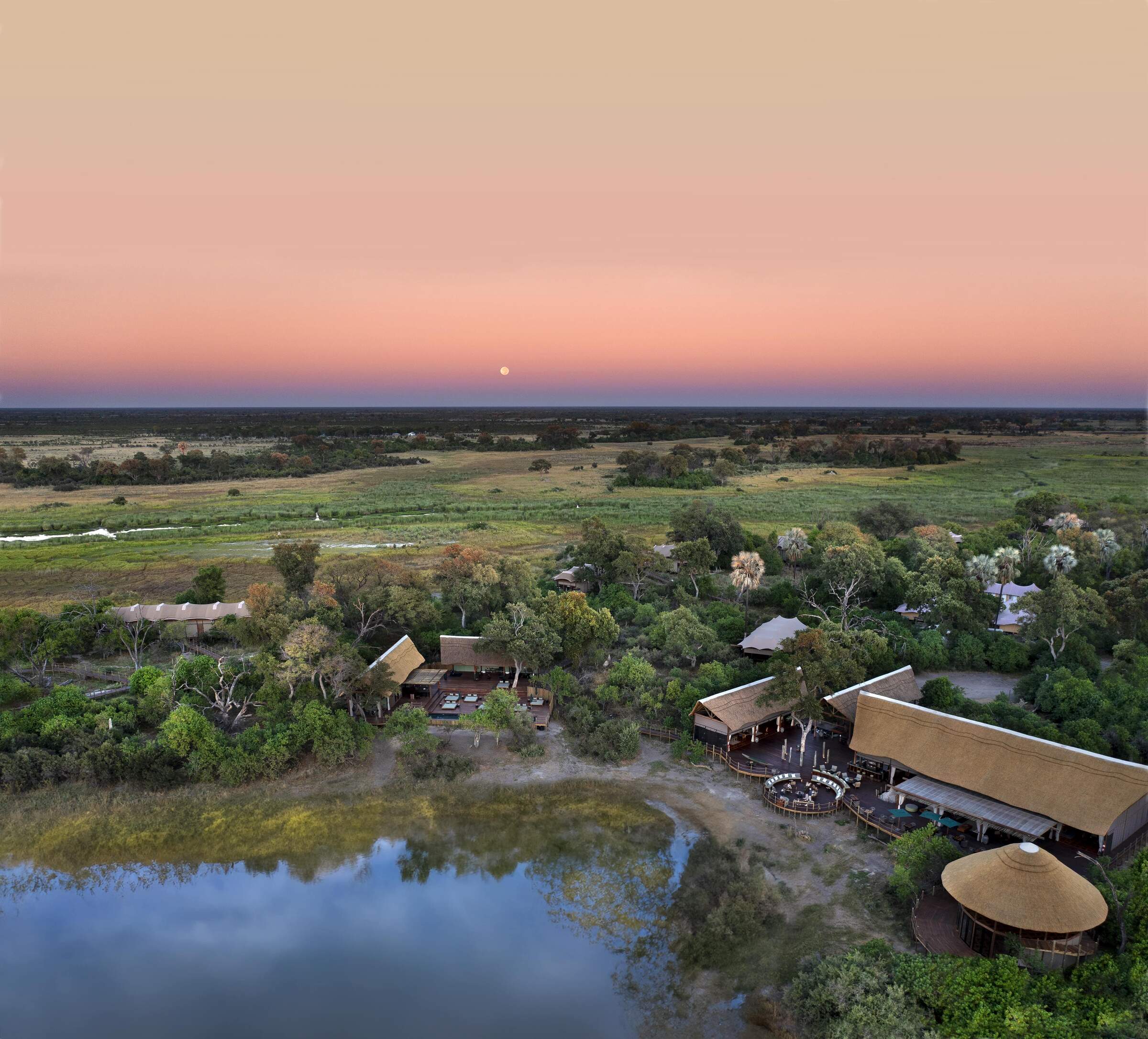
Atzaro Okavango
With a high level of tasteful luxury promised at Atzaro, we think it will be best suited to travellers seeking a touch of pampering alongside their safari.
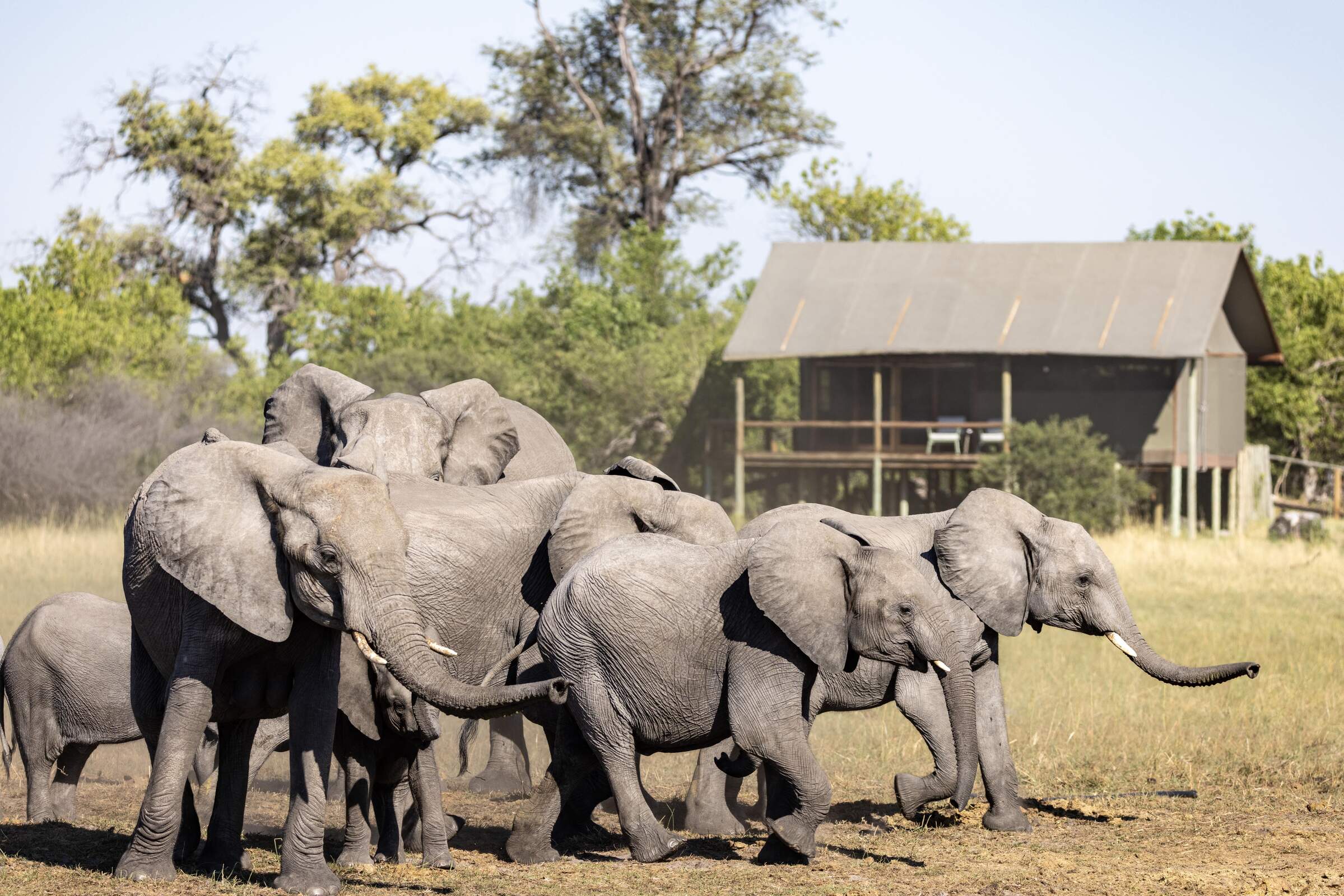
Mokolwane
Deep in the heart of the Okavango, the simple Mokolwane focuses on wildlife viewing in a large, untouched area.
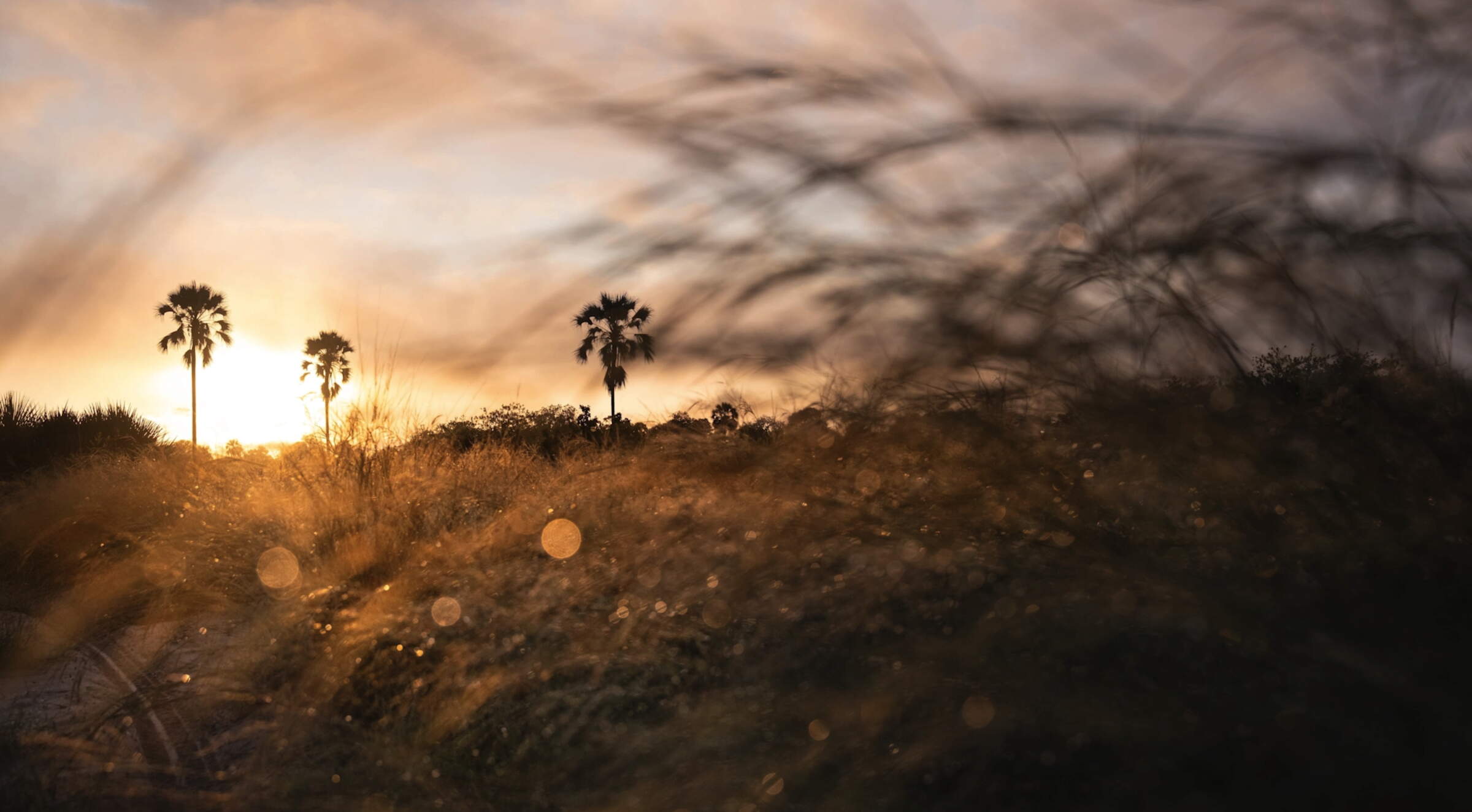
Singita Elela
Singita Elela is an exclusive safari camp on the western side of the Botswana's Okavango Delta - offering superb wildlife and water based opportunities depending on the seasonality.
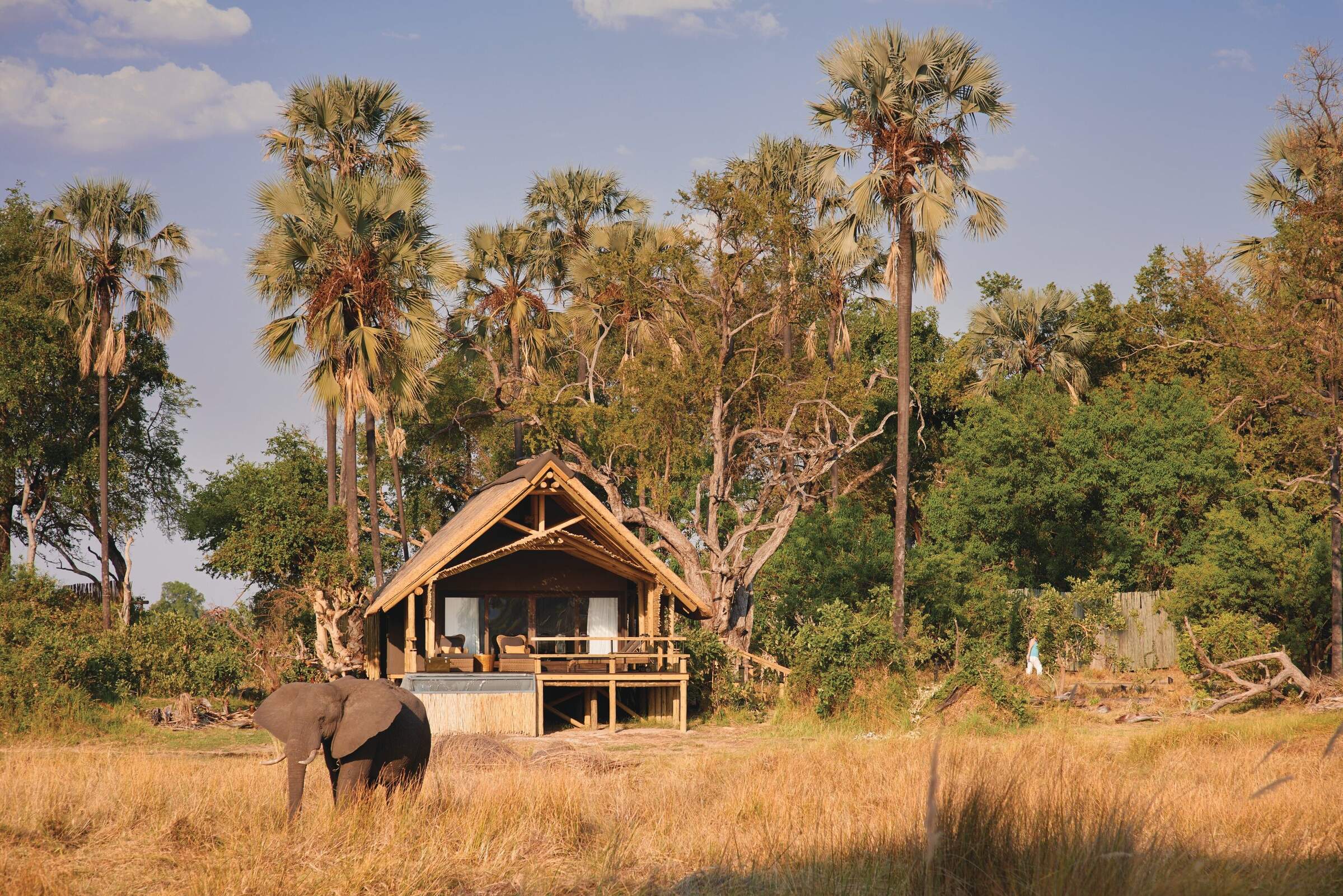
Eagle Island Lodge
Eagle Island Lodge is a luxurious camp with international-style facilities including air conditioning and intercom in each room; offering water based activities in the Okavango Delta.
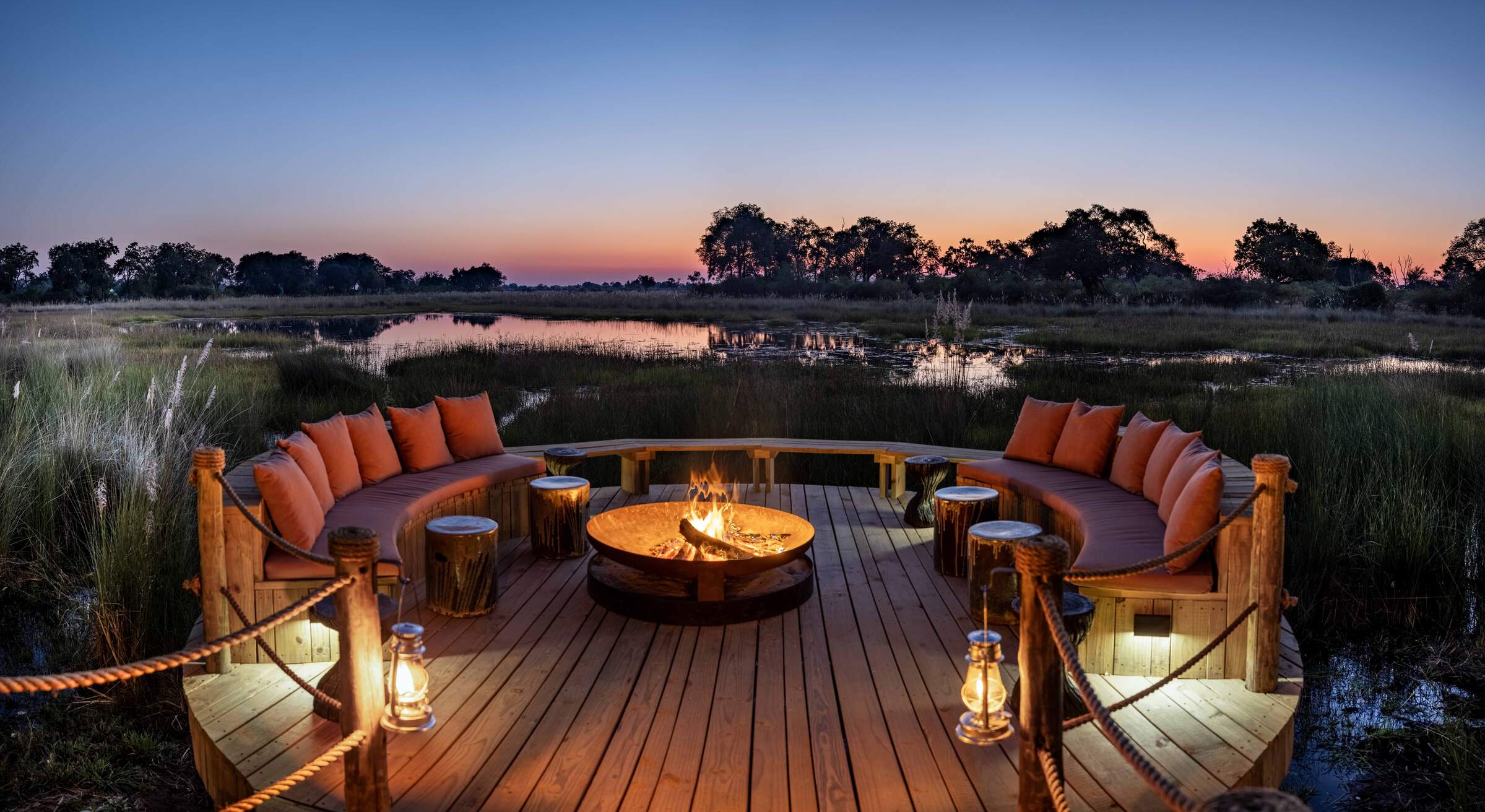
North Island Okavango
Deep in quintessentially “Okavango” territory, between deep-water and dry-land habitats, North Island focuses on a luxury safari experience with very good wildlife viewing opportunities.
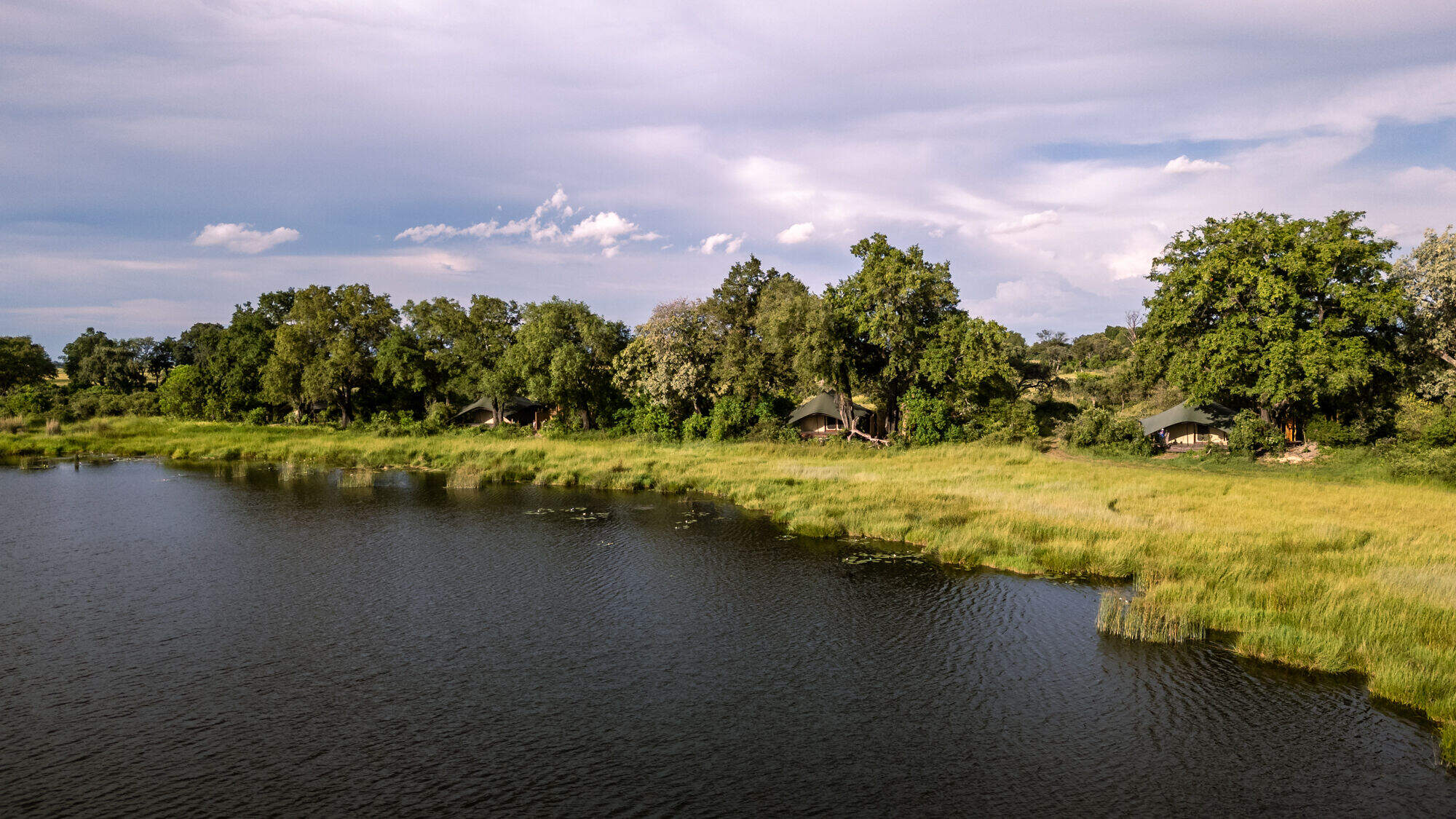
Maxa
Overlooking the permanent Maxa Lagoon, Maxa has a range of activities on offer, combining understated luxury with comfort in a remote location.
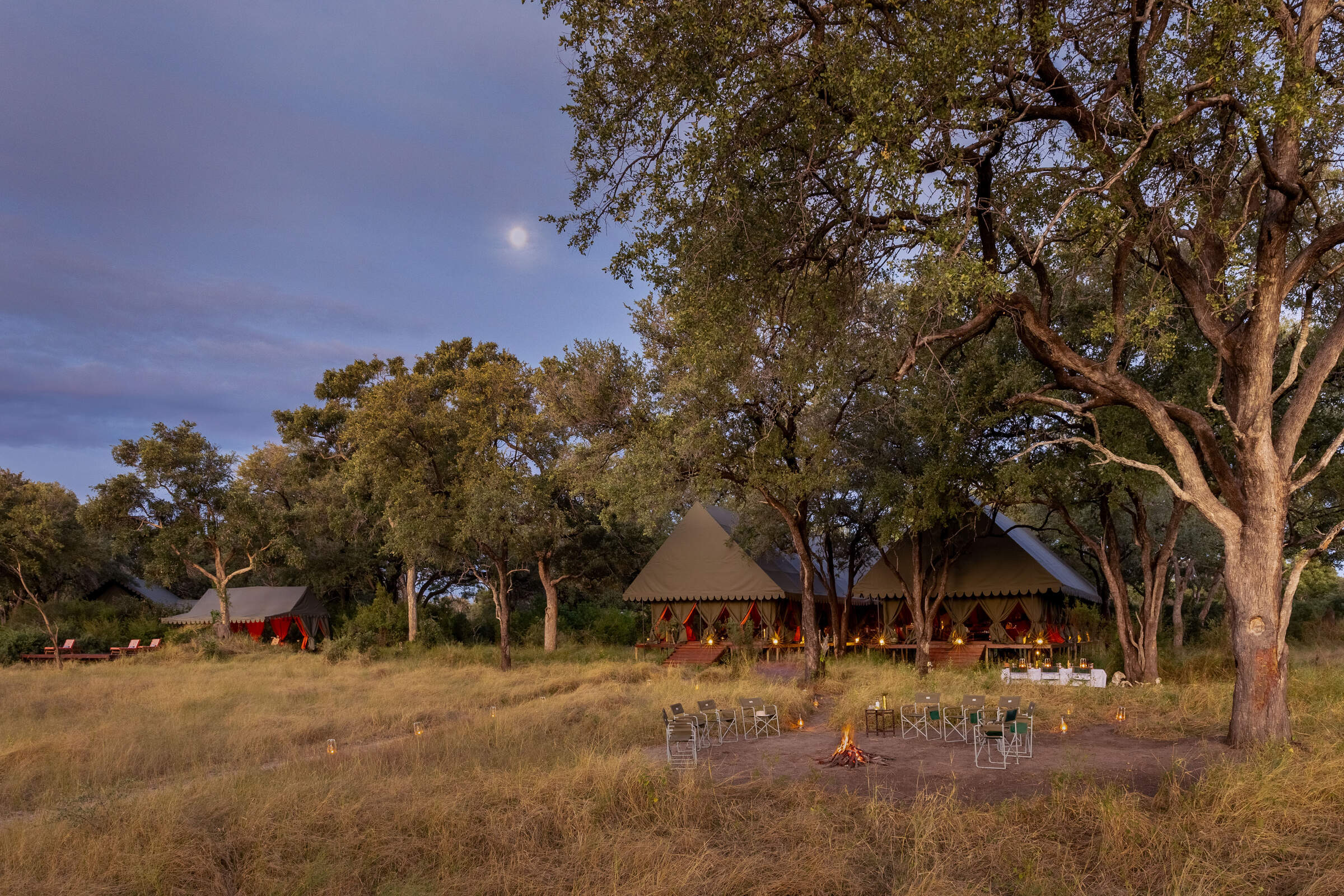
Mbamba
Deep within the northern Okavango, the classically styled Mbamba is located in the same wildlife-rich private concession as its sister camp Dukes.
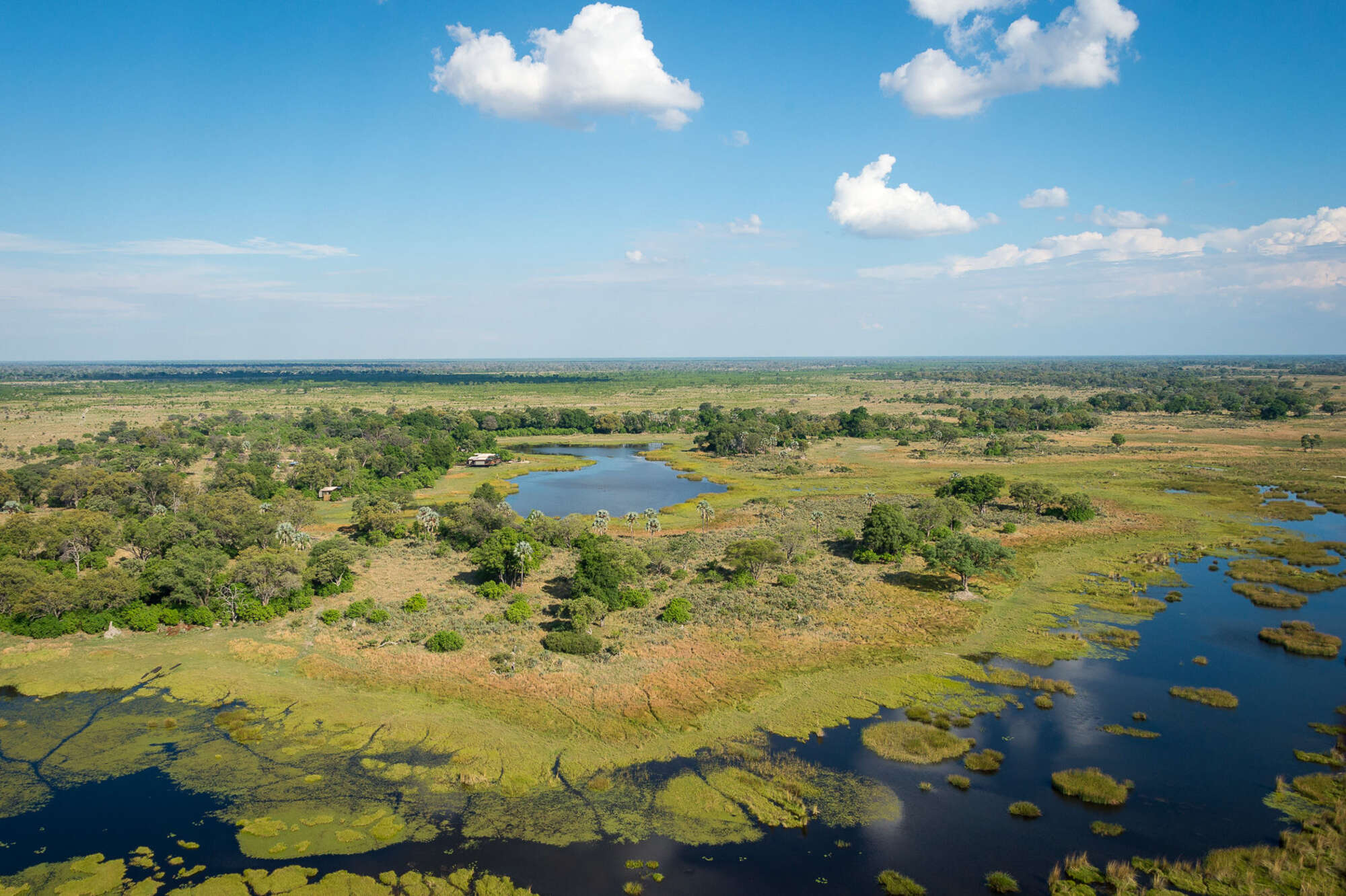
Qorokwe Camp
Luxurious and contemporary, the relatively new Qorokwe Camp is a gem in the Okavango Delta, offering land- and occasionally water-based activities in a prime wildlife area.
When to go to Okavango Delta Safari Reserves
Our month by month guide: What it's like to visit Kwetsani Camp in Okavango Delta Safari Reserves
Jan
Feb
Mar
Apr
May
Jun
Jul
Aug
Sep
Oct
Nov
Dec
Okavango Delta Safari Reserves in January
January marks the peak of the rainy season in the Okavango Delta. Evening rains are often short but heavy, accompanied by occasional dramatic thunderstorms. Temperatures remain high, although cooler than the preceding months of October to December. Wildlife can be harder to spot as animals spread out across the lush floodplains.
This month is a birdwatcher’s paradise, with migratory species in abundance over flooded areas. Rising water levels in parts of the Delta make mokoro safaris possible, offering serene and immersive experiences. The vibrant greenery and dramatic skies provide stunning opportunities for photography. With relatively low rates and fewer visitors, January is ideal for those seeking a quieter, budget-conscious Botswana safari.
- Warm temperatures with frequent evening showers
- Birdlife at its most spectacular in the Delta
- Wildlife dispersed, but insects and smaller creatures abound
- Excellent availability in Delta lodges and camps
Our view
A good time to visit, with pros & cons
Weather in January
Okavango Delta Safari Reserves in February
February mirrors January’s weather patterns, with heavy rains and slightly cooler temperatures. The Delta’s landscape is at its greenest and teeming with life. Smaller animals, insects, and vibrant birdlife dominate, as many species raise their young. The rains create temporary pools and waterholes, further dispersing larger game, while thick vegetation and tall grass adds to the challenge of spotting big wildlife.
However, Moremi Game Reserve and select areas of the Delta still offer excellent game viewing opportunities. Rising water levels enhance water activities, with boat safaris providing unique access to the Delta’s watery beauty. February is particularly rewarding for photographers seeking lush landscapes and dramatic skies and birdwatchers, with many migratory species present.
- Warm with occasional thunderstorms
- Many animals with young in the Delta
- Big game dispersed throughout wetlands
- Big game dispersed, but viewing improves in drier areas
- Lower visitor numbers and great lodge availability
Our view
This is not a great time to visit
Weather in February
Okavango Delta Safari Reserves in March
March marks the gradual end of the main rainy season in the Okavango Delta. Sunny days become more frequent, with occasional afternoon thunderstorms. The Delta remains lush and vibrant, with wildlife activity increasing as animals finish raising their young and begin congregating around permanent water sources.
Rising water levels make boat safaris a highlight, offering intimate access to the Delta’s waterways. Birdwatching is excellent, with both resident and migratory species thriving. With fewer visitors, March offers a quieter, more personal safari experience.
- Rains taper off but temperatures remain warm
- Occasional small thunderstorms in Delta
- Wildlife begins congregating around water sources
- Ideal conditions for boat safaris
- Few tourists and attractive rates at camps
Our view
A good time to visit, with pros & cons
Weather in March
Okavango Delta Safari Reserves in April
April brings clearer skies to the Okavango Delta, with the landscape remaining green and lush. Night temperatures begin to drop, especially in the southern Delta. The annual floods from Angola start to flow through the northern Delta, filling channels and lagoons, creating ideal conditions for water-based activities like boat safaris.
Wildlife viewing improves as vegetation thins and predator activity increases with cooler evenings. Moremi Game Reserve and the private concessions offer rewarding game drives, and walking safaris on the larger islands, such as Chief’s Island, become popular during this time. Birdwatching remains excellent, with many migratory species still present. April’s combination of pleasant weather, wildlife activity, and relatively low rates makes it a rewarding time to visit.
- Cooler evenings and occasional light showers
- Floodwaters begin to fill Delta channels
- Predator-prey interactions increase
- Ideal for walking safaris and boat trips
- Popular shoulder season, rates fairly low
Our view
A good time to visit, with pros & cons
Weather in April
Okavango Delta Safari Reserves in May
May is a popular time to visit the Okavango Delta, marking the last month of the shoulder season. The annual floods continue to spread through the Delta, transforming the landscape. Cooler mornings and evenings encourage predator activity, while thinning vegetation makes wildlife spotting easier, though some tall grasses may still obstruct views.
May offers excellent photographic opportunities with clear, crisp air. It's a favourite time for many visitors, combining good wildlife sightings with pleasant weather. Camp bookings throughout the Delta fill up quickly during this period.
This is a perfect month for scenic flights, offering breathtaking views of the advancing floodwaters. Mokoro trips through the Delta’s tranquil waterways provide a unique perspective on the environment. Camps start to fill quickly as the Delta’s combination of pleasant weather and excellent wildlife sightings makes it a favourite among safari-goers.
- Cool mornings and evenings with little rain
- Improved game viewing as Delta grasses thin
- Predator activity increasing in drier areas
- Scenic flights and water activities highly recommended
- Last month of shoulder season for camps
Our view
A very good time to visit
Weather in May
Okavango Delta Safari Reserves in June
June signals the start of the dry season in the Okavango Delta. Days are warm, with clear skies, while mornings and evenings can be cold, occasionally reaching freezing temperatures. The annual floods reach their peak, creating spectacular conditions for water-based activities like boat safaris along the Khwai River and in private concessions.
Wildlife concentrates around permanent water sources as surface water dries up, improving game viewing. The thinning vegetation and crisp, clear air make June perfect for photography. High demand for camp bookings reflects its popularity, as this month combines great game viewing and pleasant weather.
- Warm days, cold mornings and nights
- Peak floodwaters make boat safaris unforgettable
- Wildlife congregates around permanent water sources
- Excellent conditions for photography
- High demand for camps and lodges
Our view
Fantastic: the very best time to visit
Weather in June
Okavango Delta Safari Reserves in July
July offers cool mornings and evenings with warm, sunny days, making it ideal for wildlife viewing. The floodwaters remain at their peak, providing excellent opportunities for boat safaris. Vegetation continues to thin, enhancing visibility on game drives in Moremi Game Reserve and the Okavango’s private reserves.
Large herds of elephants and buffalo are common sights as they gather near water sources. Predator sightings, including lions and leopards, increase as prey concentrates. Birdwatching is rewarding, and the crisp winter air creates stunning photographic conditions. July is one of the most popular months to visit, with many lodges fully booked well in advance.
- Comfortable days, cold mornings and nights
- Excellent game viewing and predator activity
- Moremi and Khwai areas become busy
- Private concessions offer exclusivity
- High season rates; advance bookings essential
Our view
Fantastic: the very best time to visit
Weather in July
Okavango Delta Safari Reserves in August
August remains a highly sought-after month for visiting the Okavango Delta. Nights are cool, while daytime temperatures rise gradually. Wildlife viewing is exceptional as animals concentrate near water sources, while the Delta’s floods are typically at their peak, offering picturesque settings for excellent boat safaris.
Walking safaris and game drives in areas like Moremi Game Reserve and Chief’s Island are particularly rewarding. Large herds of elephants and buffalo are common sights, and predator activity is high, with increased chances of seeing lions, leopards, and wild dogs hunting. The clear skies and lack of humidity create excellent stargazing conditions. With many travellers visiting during European and North American holidays, lodge availability can be challenging.
- Dry, warm days and cool nights in the Delta
- Fantastic wildlife viewing near water sources
- Excellent opportunities for game drives and boat safaris
- Cloudless skies, spectacular stargazing
- High demand for accommodation – book early
Our view
Fantastic: the very best time to visit
Weather in August
Okavango Delta Safari Reserves in September
September is a favourite for many safari-goers in the Okavango Delta. Daytime temperatures rise, but nights remain cool. The landscape transforms as greenery fades, and hazy conditions create dramatic sunsets. Wildlife viewing peaks as animals cluster around permanent water sources, with especially large numbers of elephants and buffalo. This concentration of prey attracts predators, increasing chances of witnessing exciting hunts.
The return of migratory birds enhances birdwatching. Water levels begin to recede, but boat cruises are still possible. Dusty conditions may challenge photographers, but the stunning landscapes and wildlife action more than make up for it.
- Warm days, cool nights in the Delta
- Prime month for Okavango wildlife viewing
- Migratory birds return, enriching birdwatching
- Spectacular sunsets and dramatic scenery
- High season rates, many Delta camps full
Our view
Fantastic: the very best time to visit
Weather in September
Okavango Delta Safari Reserves in October
October is the hottest and driest month in the Okavango Delta. Wildlife concentrates around the last remaining water sources, creating some of the most dramatic game viewing opportunities of the year. Predator-prey interactions are frequent and visibility is excellent, making for thrilling safaris.
Walking safaris are particularly rewarding, especially on smaller islands, but early starts are essential to avoid the midday heat. Towards the end of the month, the first rains may bring relief and begin rejuvenating the parched landscape. Despite the heat, October offers excellent big-game viewing and dramatic photographic moments of animal interactions.
- Hot days, with late-month chances of rain
- Outstanding big-game viewing near water sources
- Water activities limited as floods recede
- Walking safaris provide unique experiences
- Final month of the peak safari season
Our view
Fantastic: the very best time to visit
Weather in October
Okavango Delta Safari Reserves in November
November marks the start of the green season in the Delta. Rising humidity and temperatures often lead to the first heavy rains; these are typically short, heavy showers in the late afternoon or night, creating spectacular scenes and bringing a flush of green to the parched landscape. Wildlife begins to disperse as waterholes refill, but game drives still offer rewarding sightings.
Water levels may be low, limiting boat activities, but November is exceptional for birdwatching, with the arrival of many migratory species. Scenic flights highlight the contrast between dry and wet areas. The first two weeks are popular for travellers seeking good game viewing at lower rates as the Delta transitions into its shoulder season.
- Hot, humid days in the Delta
- Dramatic rain showers , increasing as month progresses
- Migratory birds arrive in abundance
- Wildlife watching good, but less predictable
- Shoulder season offers mid-range rates
Our view
A good time to visit, with pros & cons
Weather in November
Okavango Delta Safari Reserves in December
December sees the rainy season in full swing across the Okavango Delta, bringing some respite from high temperatures. Game viewing becomes more challenging as wildlife disperses, but great sightings can still be had. The landscape transforms dramatically, with lush vegetation sprouting across the Delta. This period is excellent for birdwatching, with numerous migratory species present.
Water levels begin to rise, gradually improving conditions for boat safaris. The green season offers unique photographic opportunities, with dramatic skies and newborn animals. December is ideal for visitors seeking a more intimate Delta experience, with fewer tourists and lower rates at many camps and lodges. The combination of wildlife, birdlife, and scenic beauty makes it a rewarding time to visit.
- Warm temperatures
- High chance of rain in short, heavy storms
- Wildlife more dispersed across Delta
- Game viewing more challenging in wetlands
- Low-season rates and fewer visitors in most Delta camps
Our view
A good time to visit, with pros & cons
Weather in December

Looking for inspiration on where to travel next?
Visit our trip chooser to explore your options and find inspiration for your perfect African adventure
Inspire me